Investment climate, EU integration, reforms. UBA held the First Investment Forum
On June 6-7, 2024, the Ukrainian Bar Association held the First Investment Forum. Over two days, the event served as a platform to discuss prospective investment opportunities and address legal challenges in areas crucial for Ukraine's sustainable development.
The first day of the Forum took place online. The event was opened by Mykola Stetsenko, President of the UBA, Managing Partner at AVELLUM. In his welcome speech, he expressed confidence that the discussions at the Forum would be beneficial, contribute to business projects and ideas, and enhance foreign investors' understanding of the business environment in Ukraine.
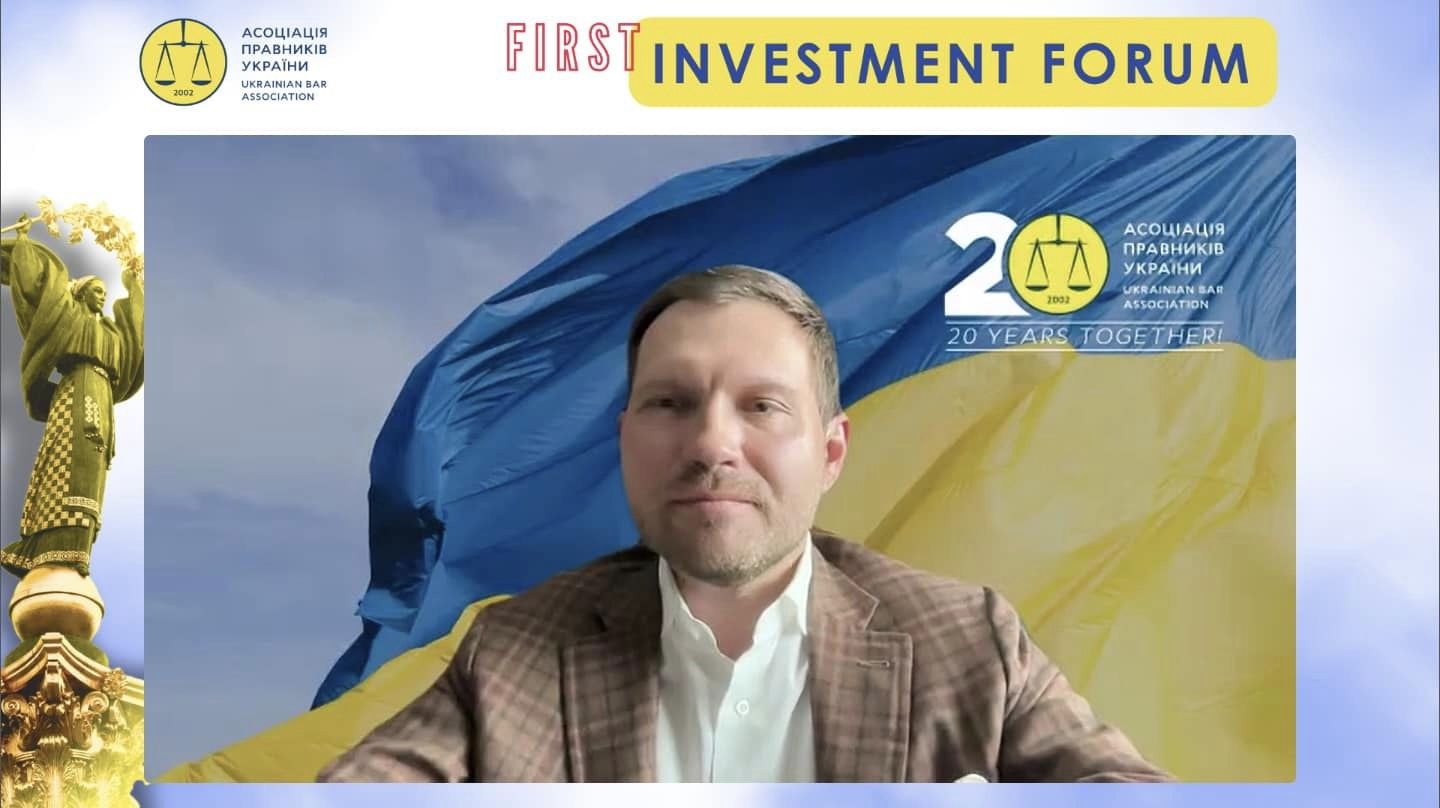
Mr. Stetsenko thanked the supporters of the Forum's organization:
- General Partner: ICU Group;
- Partner: AEQUO;
- Session Partners: CMS Cameron McKenna Nabarro Olswang, SAYENKO KHARENKO, LCF Law Group, MORIS, AVELLUM, INTEGRITES.
Participants were also greeted by Andy Hunder, President of the American Chamber of Commerce in Ukraine. He noted that foreign businesses continue to operate in Ukraine and support the country amidst the full-scale Russian invasion.
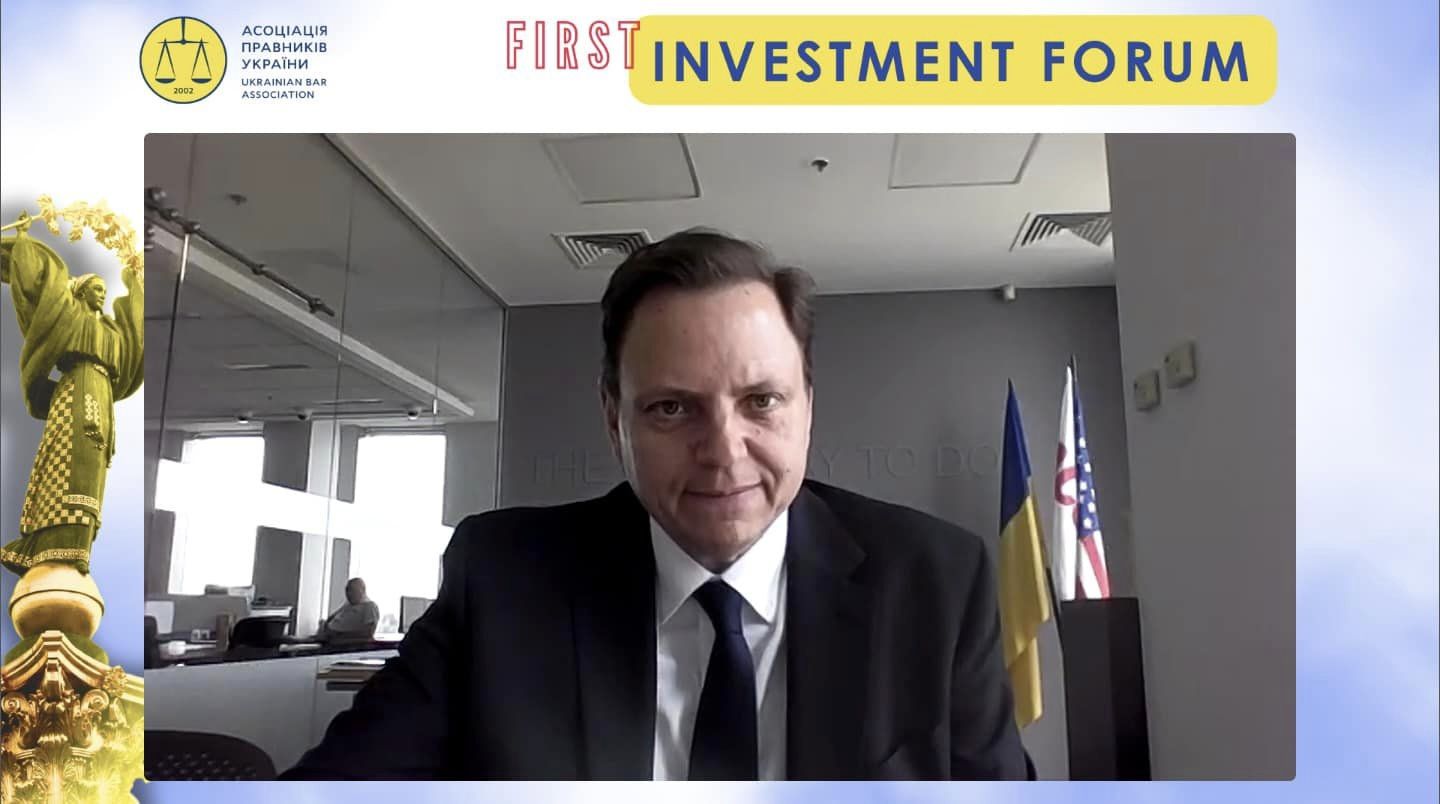
Makar Paseniuk, Founding Partner at ICU Group, in his welcome speech, remarked that the First Investment Forum is unique and interesting. He emphasized that finance and investment are impossible without the work of lawyers. "We are interconnected and, I believe, will become even more so," added Mr. Paseniuk.
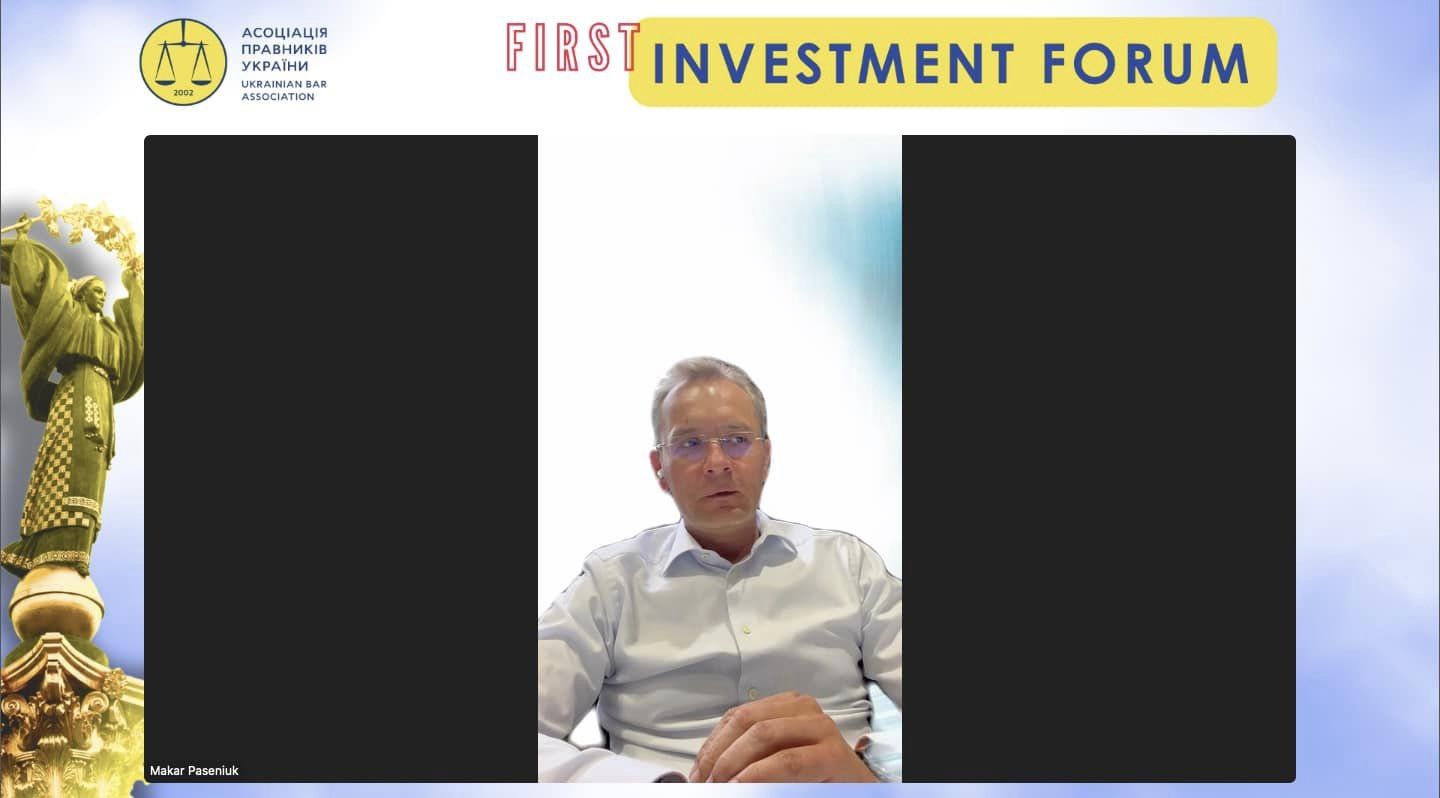
He also encouraged Forum participants to be inspired by the ideas discussed at the event.
The first session of the Forum, titled "Helicopter view: investment climate in Ukraine," was moderated by Olga Fedosova, Partner at White & Case (Paris, France). She highlighted that the discussion would focus on Ukraine's investment climate and the challenges investors face. Ms. Fedosova emphasized that, despite the full-scale war, Ukraine's economy is recovering and developing.
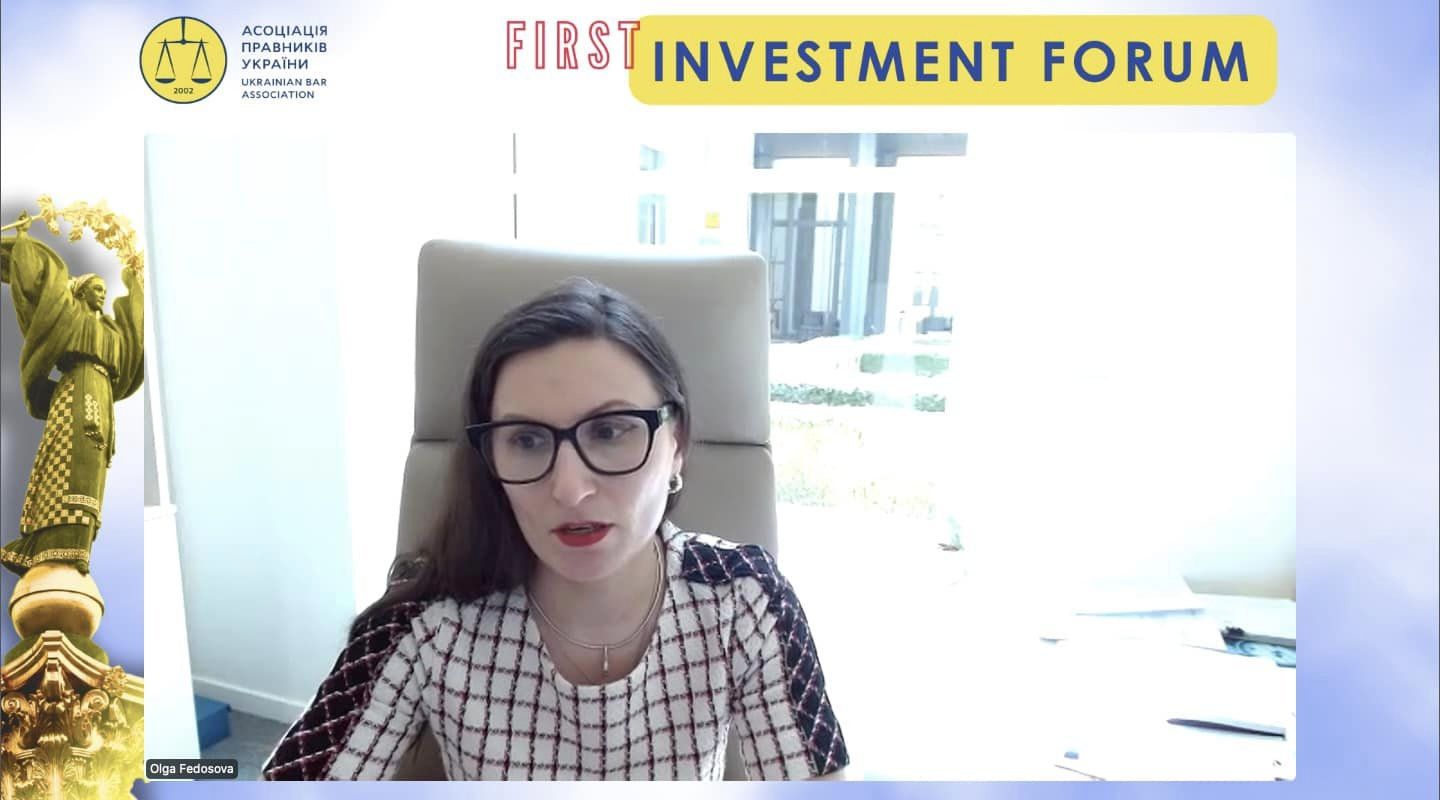
Marlena Hurley, Managing Director, Political Risk Insurance & Reinsurance at U.S. International Development Finance Corporation (DFC), praised the resilience of Ukrainian businesses amid the war. She emphasized that her organization is doing everything possible to support key sectors of Ukraine's economy. Ms. Herlihy mentioned that the corporation offers coverage for expenses incurred due to Russia's aggression against Ukraine.
Bozidar Djelik, Managing Director, Head of Lazard for Central and Eastern Europe, CIS (ex-Soviet Union), and Turkey, opined that the best investors in Ukraine are currently those businesses already present in the country, suggesting that working with them would yield the most success. He also highlighted the need for specific business insurance during wartime.
According to Mr. Djelik, foreign investors want to rely on those who conduct on-site technological and environmental assessments, a capability Ukraine should develop.
Makar Paseniuk, Founding Partner at ICU Group, noted that most deals in Ukraine are now being made by local rather than foreign companies. He believes post-war investment in Ukraine will be associated with significant risk, primarily attracting adventurers in the initial stage.
Discussing the attractiveness of investing in Ukraine under current conditions, Mr. Paseniuk suggested that only a large, attractive product could change the situation, citing green energy, which has attracted $12 billion in investments to Ukraine, as an example.
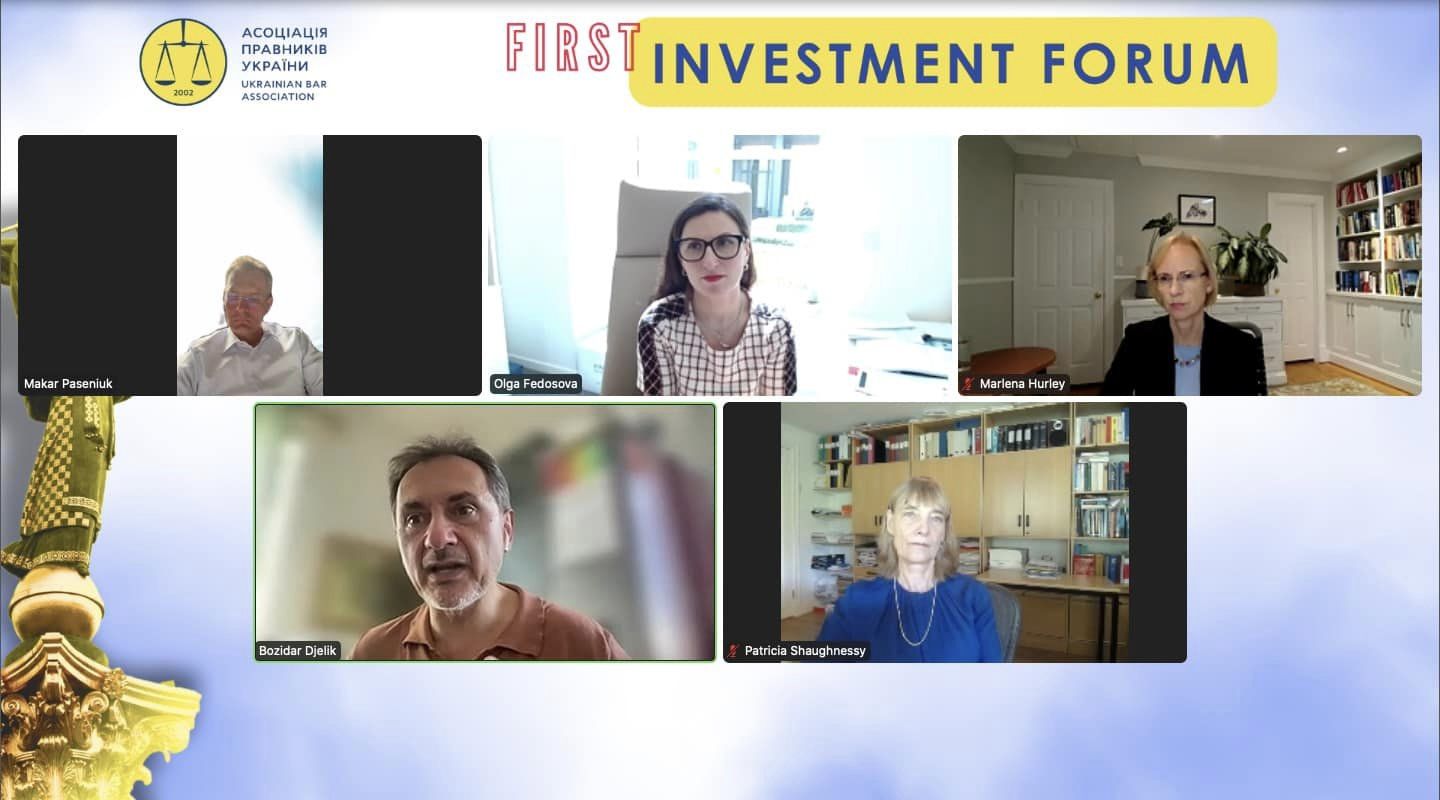
Stefan Weiler, Head of CEEMEA Debt Capital Markets at J.P. Morgan, discussed a project to create a fund for Ukraine's post-war reconstruction. J.P. Morgan and the investment company BlackRock are helping the Ukrainian government establish this fund.
Patricia Shaughnessy, Professor at Stockholm University, emphasized the importance of Ukraine's cooperation with the international community to enhance the country's investment attractiveness.
Following this, a report "Unlocking Investment in Ukraine," resulting from the collaboration between the British Institute of International and Comparative Law and the UK's Ministry of Justice, was presented.
The report was introduced by:
- Maria Tymofienko, Head of Projects, Ukraine International Law Response, British Institute for International and Comparative Law;
- Sir Robin Knowles CBE, Judge of the High Court of England & Wales, Judge of the London Commercial Court;
- Brian Haines, Policy Advisor, Ukraine Response, UK Ministry of Justice.
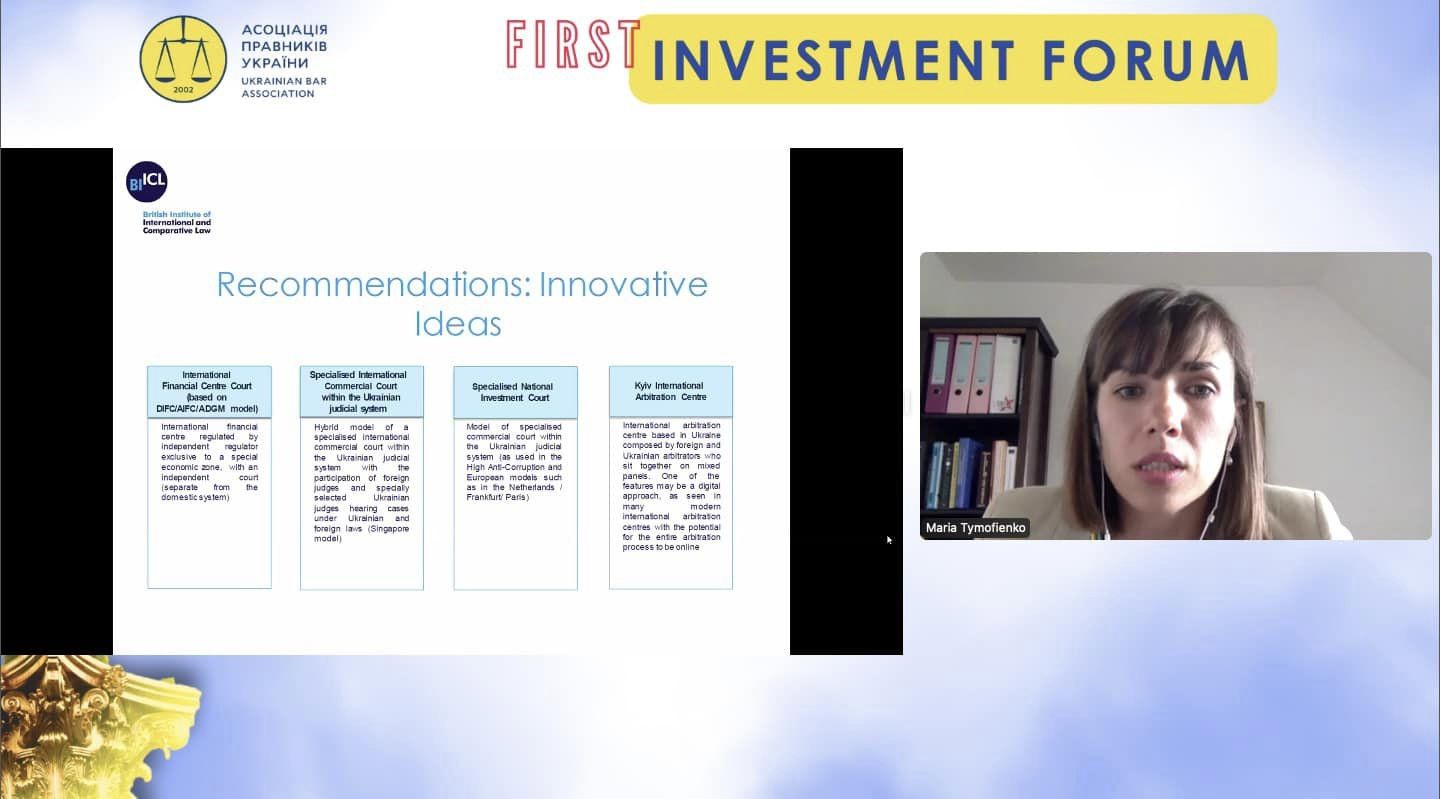
The project included:
- review of justice sector reforms in Ukraine;
- review of current dispute resolution options available to investors in Ukraine;
- review of international practice in the setting up of international commercial courts;
- business stakeholder survey;
- Ukrainian judiciary survey;
- interviews with experts and stakeholders.
The project report contains key recommendations on steps that Ukraine can take to advance its commercial dispute resolution system, including completing reforms that are already underway, capacity-building measures and creating new institutions.
The first day of the Forum was concluded with a discussion dedicated to common myths about doing business in Ukraine. The session was moderated by Daniel Cousens, Corporate Partner at Linklaters (Warsaw, Poland).
The panel speakers discussed regulatory obstacles for businesses, currency restrictions, the practical impact of the war on business operations, and more.
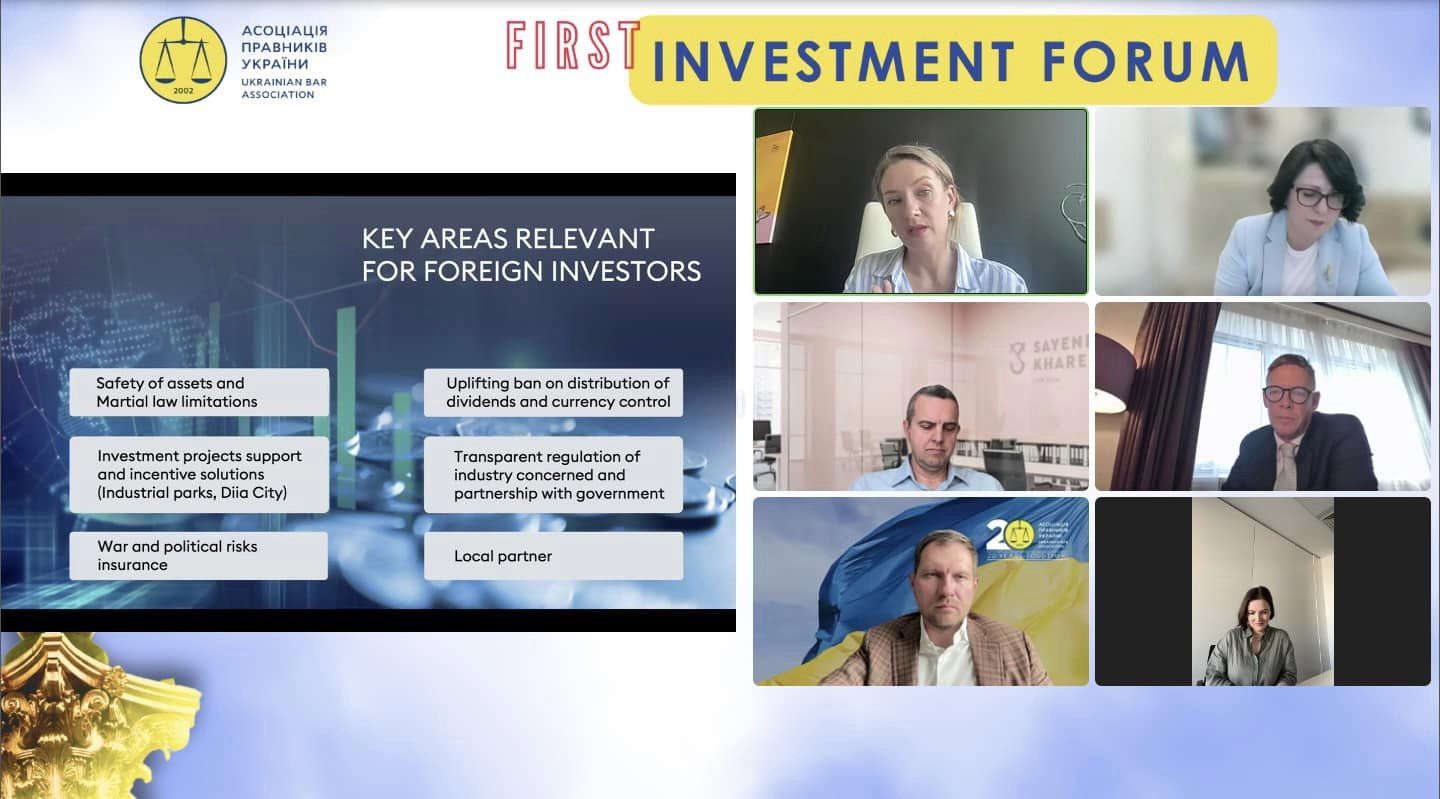
Anna Babych, Executive Partner at AEQUO, Head of M&A and Corporate/Commercial, shared information on recent legal changes that could affect the investment climate in Ukraine. She highlighted the tools the Ukrainian government uses to support and stimulate investments during the full-scale war, including recent positive changes such as amendments to the law on state support for significant investment projects, the adoption of a law on investment insurance against war risks, and the relaxation of currency restrictions by the National Bank of Ukraine, particularly allowing the repatriation of "new" dividends.
Mykola Stetsenko, UBA President, Managing Partner at AVELLUM, informed the Forum audience about Ukraine's achievements in combating corruption. He spoke about the establishment of Ukraine's anti-corruption infrastructure — the National Anticorruption Bureau of Ukraine, the Specialized Anticorruption Prosecutor’s Office, the National Agency on Corruption Prevention, and the High Anticorruption Court — and its recent successes and achievements. Among the accomplishments in preventing corruption, Mr. Stetsenko mentioned:
- electronic declaration;
- public access to officials' declarations;
- NAPC's monitoring of officials' lifestyles;
- a system of penalties for non-compliance with transparency requirements (fines for false information in declarations or late submission, etc.).
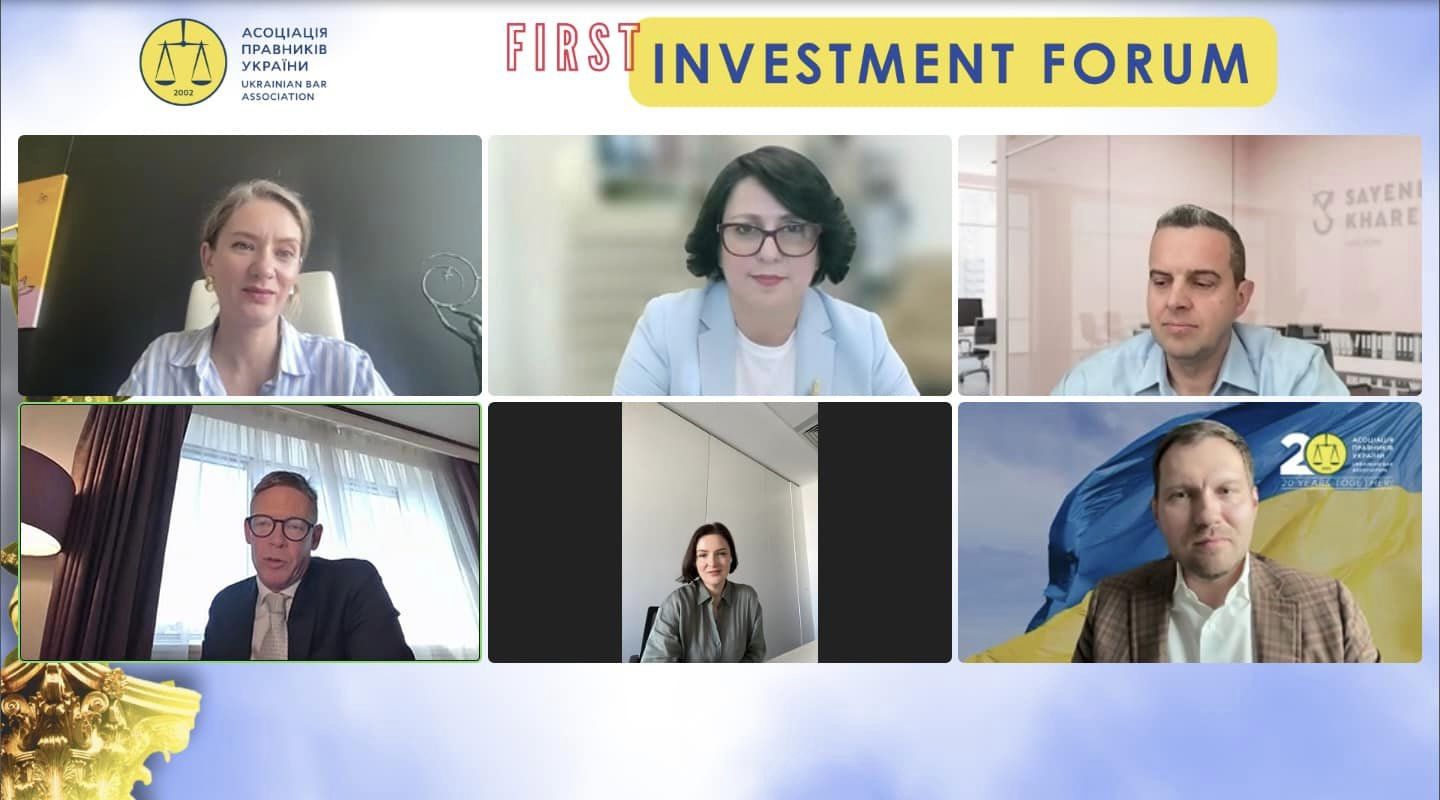
Experts also addressed issues related to the judiciary. Olena Kibenko, Judge of the Cassation Commercial Court within the Supreme Court, provided statistics on the average duration of commercial case hearings in 2023:
- first instance: 79 days;
- second instance: 67 days;
- third instance: 45 days;
- overall: 191 days (6-7 months).
Ms. Kibenko noted that last year, the first instance commercial courts issued 127,974 decisions, of which 23,099 (18%) were appealed, and 9,183 (7%) were challenged in cassation. The Supreme Court annulled first instance decisions and returned cases for reconsideration in 16% of instances.
The discussion also featured contributions from Volodymyr Sayenko, Partner at SAYENKO KHARENKO, and Tetyana Dovgan, Corporate/M&A Partner in the Kyiv office of CMS Cameron McKenna Nabarro Olswang.
The second day of the First Investment Forum took place at the Hilton Kyiv Hotel.
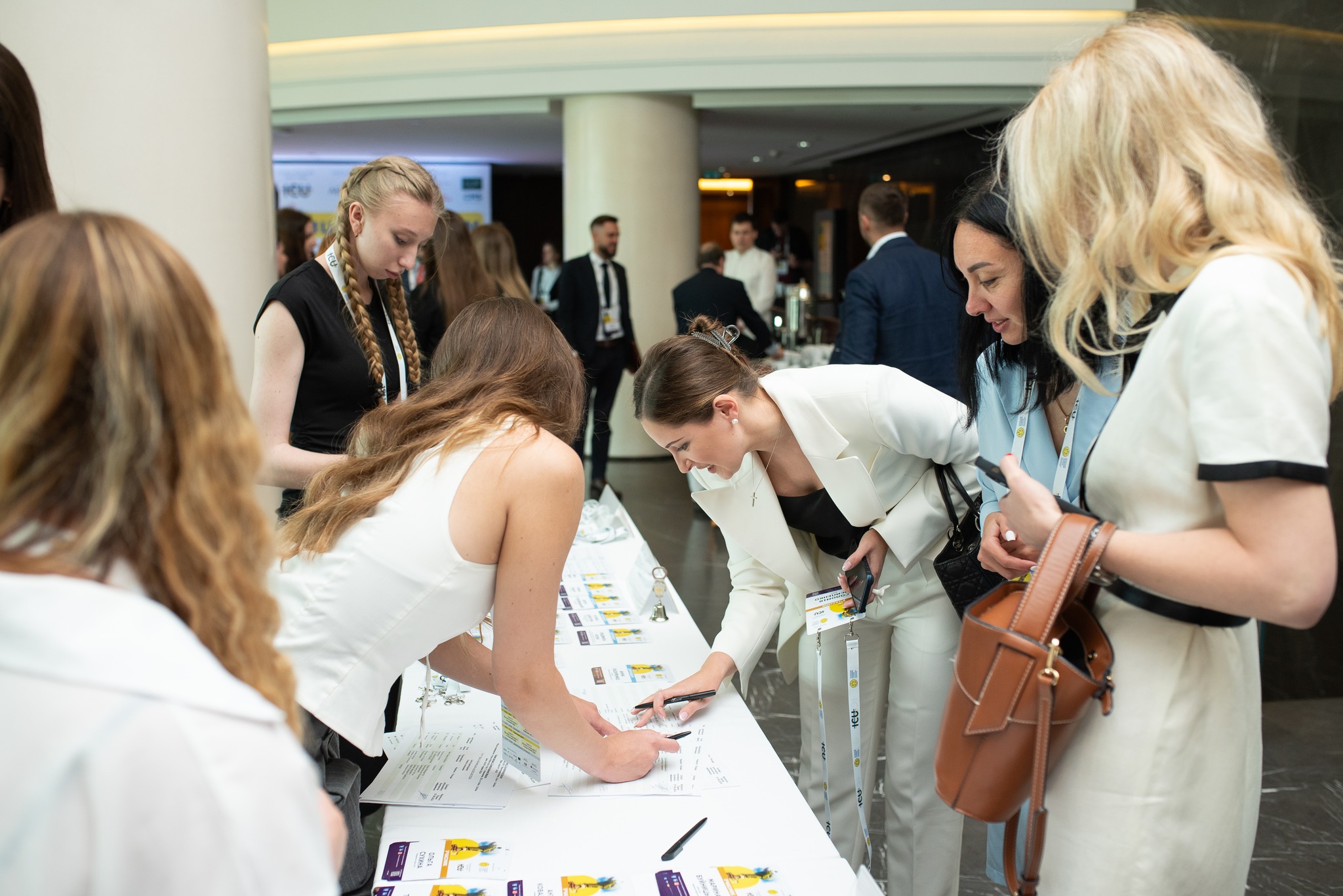
Mykola Stetsenko, UBA President, Managing Partner at AVELLUM and the Head of Corporate/M&A, in his welcoming speech, thanked the participants of the first day of the Forum. He also expressed gratitude to the military personnel who are currently defending Ukraine from the Russian invasion. The event participants honored the memory of those who died for Ukraine's freedom and independence with a moment of silence.
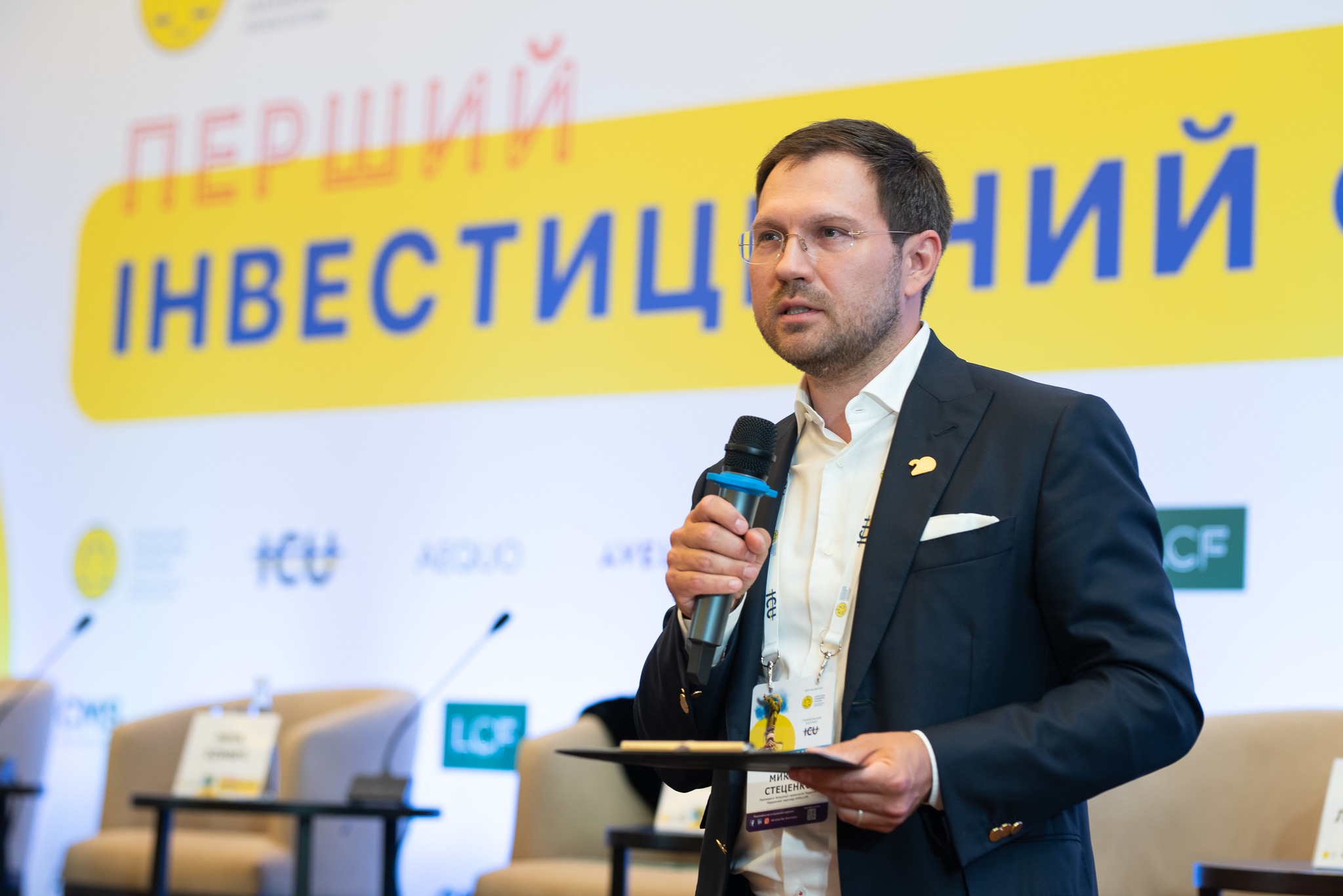
Mr. Stetsenko noted that the focus of the second day of the Forum would be on the best practices in the investment sector. The UBA President expressed hope for fruitful discussions and emphasized the importance of dialogue between lawyers and business. Mykola Stetsenko announced that a memorandum summarizing each session and providing relevant recommendations would be issued following the Forum.
Liudmyla Yenina, Director of the Department of Economic Diplomacy, Ministry of Foreign Affairs of Ukraine, also greeted the Forum participants. She promised that diplomats would provide all possible support to Ukrainian businesses operating under the conditions of full-scale war.
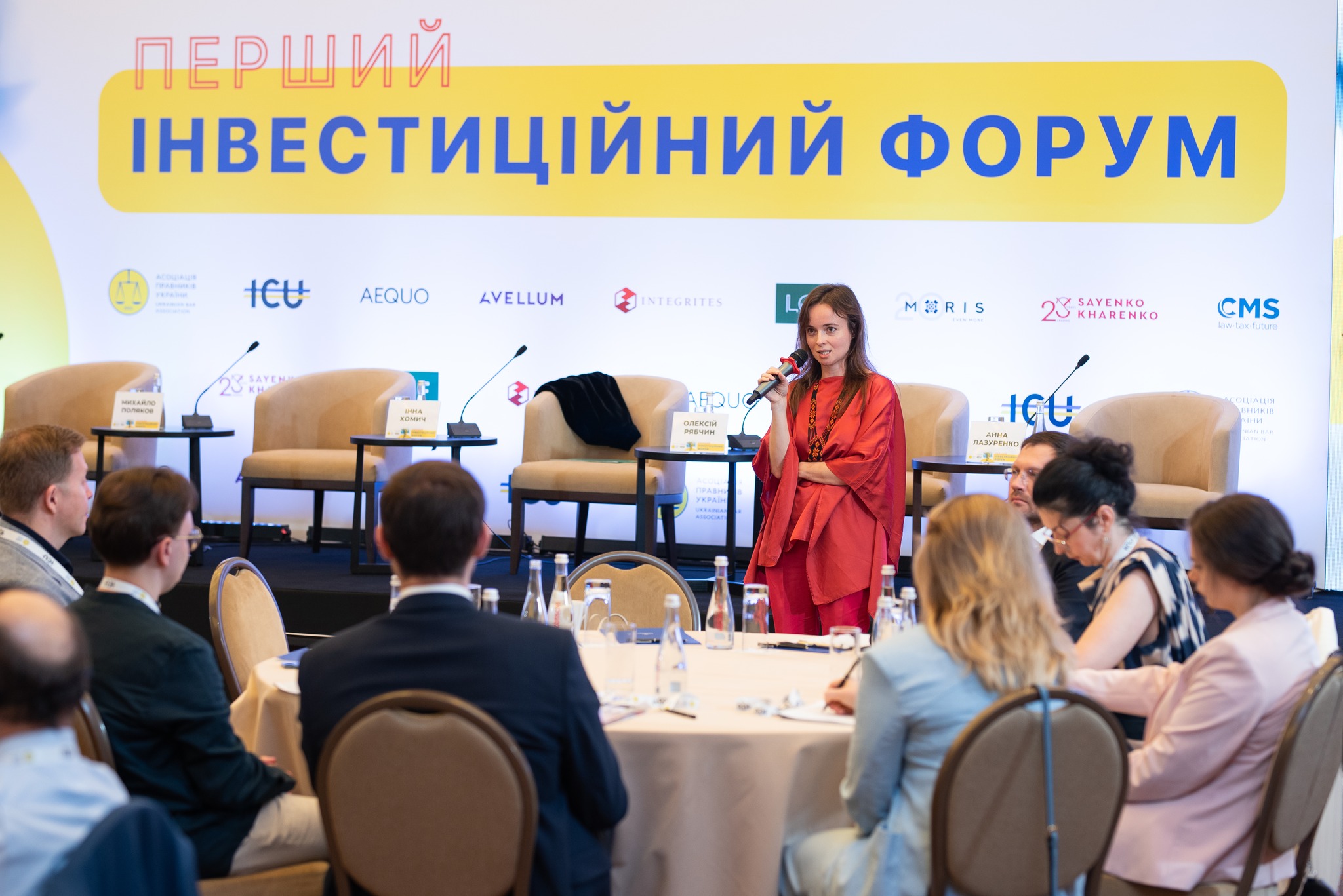
Ms. Yenina stressed the importance of attracting investments and adapting Ukrainian legislation to EU laws. She highlighted the need to create new platforms and attract private investors, including foreign ones.
The MFA representative discussed the economic diplomacy tools the Ukrainian government uses to support businesses, including support for exporters.
The first session of the second day of the Forum was titled "Ukraine's accession to the European Union: implications for business?". The discussion was moderated by Anzhela Makhinova, Partner at SAYENKO KHARENKO. She noted that the focus of the discussion would be on the issues of Ukraine's EU integration from a business perspective, including procedural matters. Ms. Makhinova also suggested discussing how open the EU market is to Ukrainian business.
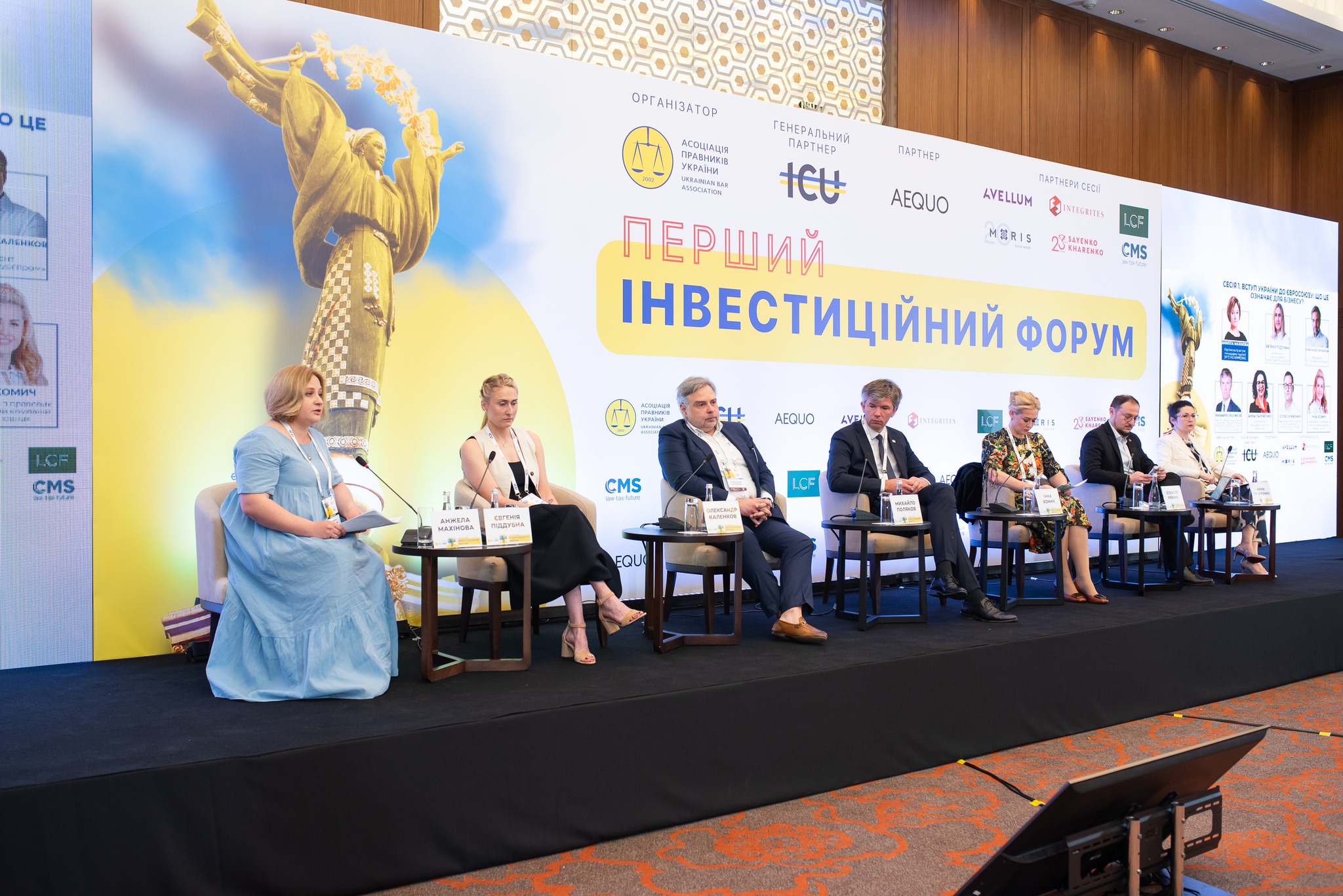
Oleksii Riabchyn, Advisor to the Deputy Prime Minister for European and Euro-Atlantic Integration of Ukraine, stated that the conditional target for Ukraine's accession to the EU is 2030. According to him, by this time, the country must adapt its national legislation to European standards. He emphasized that adapting Ukrainian legislation to EU laws is a dynamic and ongoing process, especially as the newly elected European Parliament will adopt new laws to which Ukraine will also need to adapt.
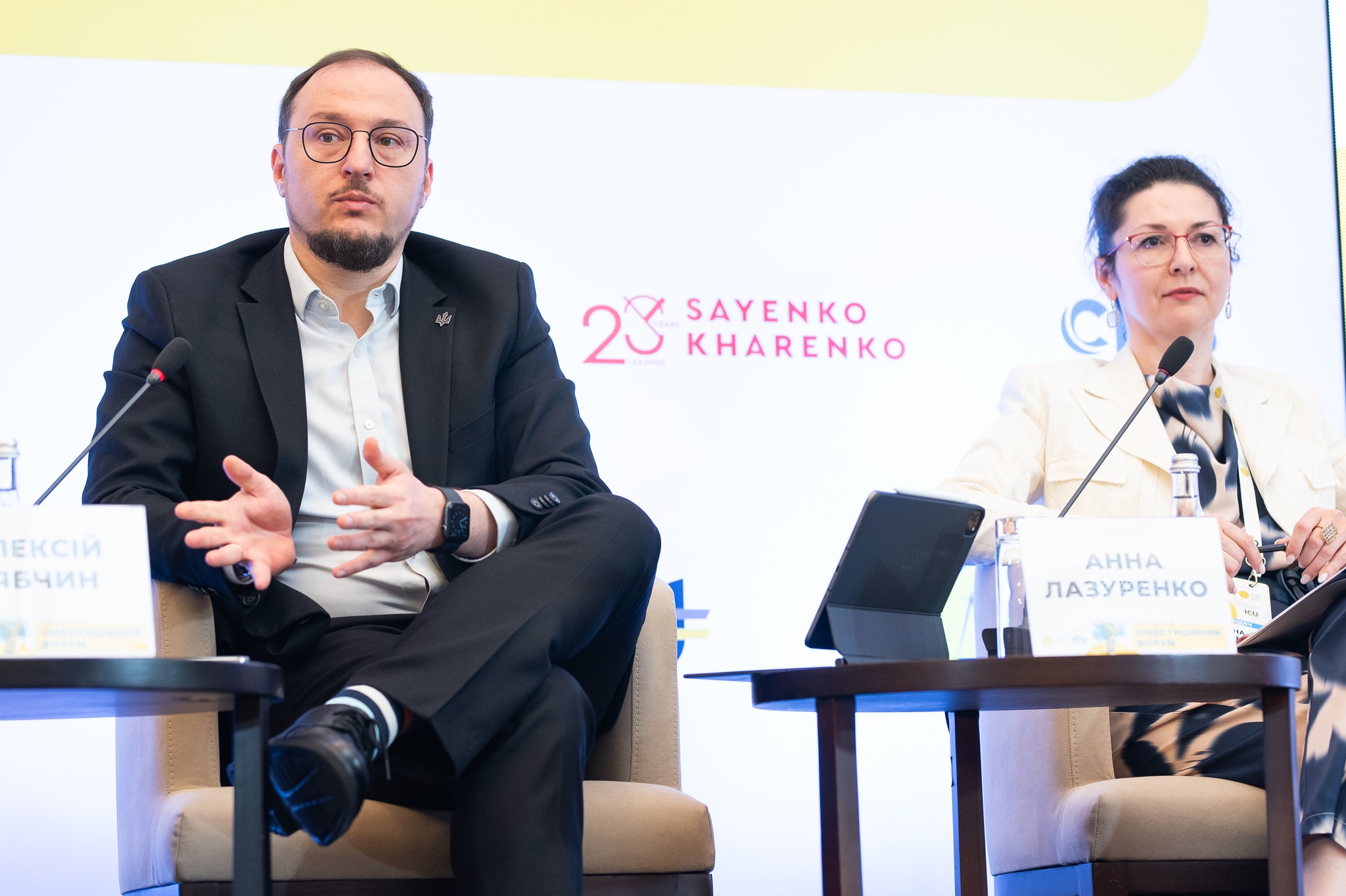
The Advisor to the Deputy Prime Minister also outlined the nuances of government-business interaction in the process of Ukraine's European integration, particularly how businesses can advocate for their interests in this process.
Inna Khomych, Director of Legal Affairs at the "Nova Poshta" Group of Companies, stated that Nova Poshta continues to develop its business despite the challenging war conditions, having opened five sorting terminals during the full-scale war.
Ms. Khomych also shared the company's experience in expanding its business in the EU. The NOVA group has entered the markets of 13 European countries. However, she noted that the EU market is "not very welcoming" to new competitors from Ukrainian businesses. She spoke about the difficulties and obstacles, primarily bureaucratic ones, that NOVA faces in the European market.
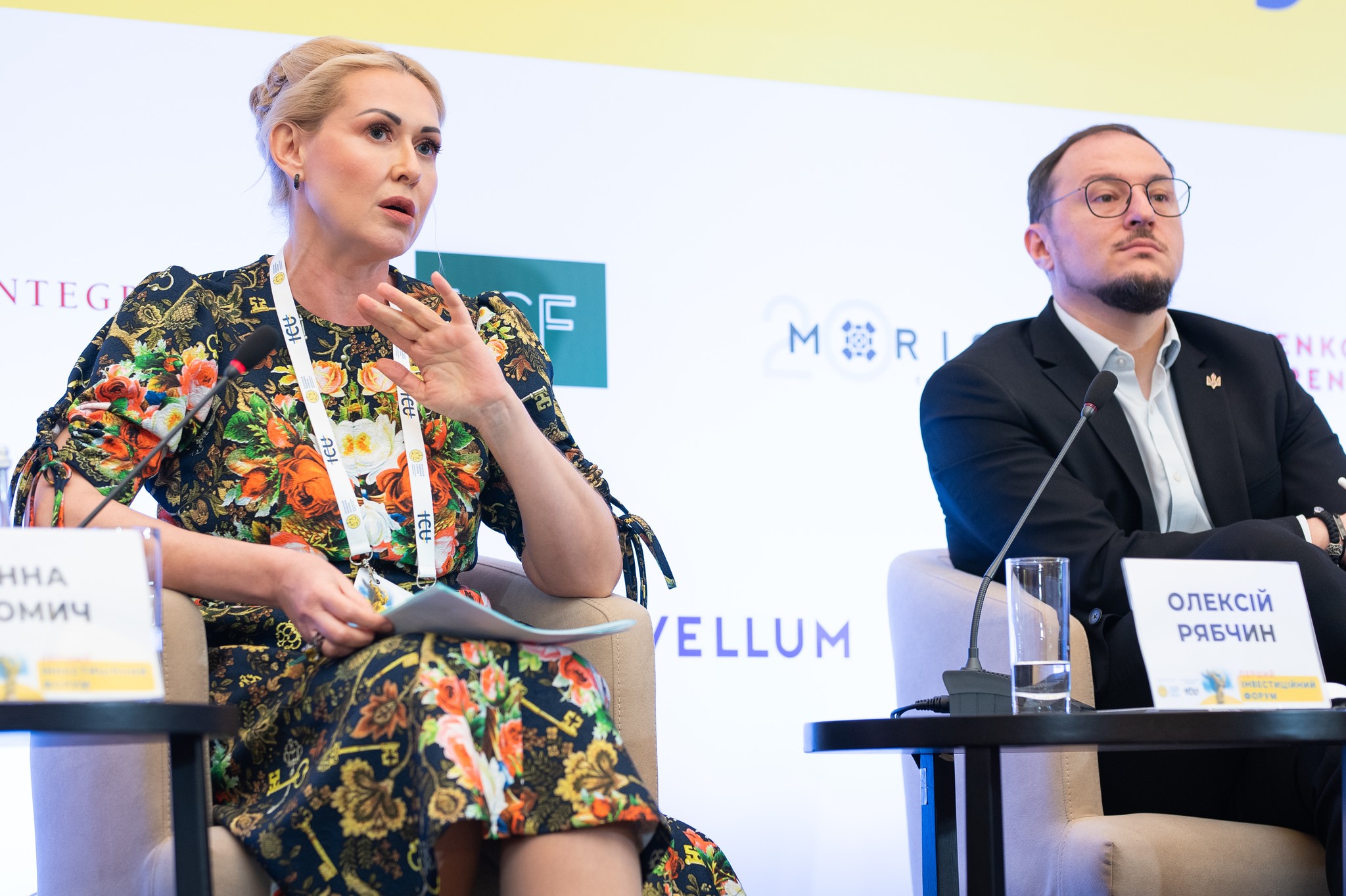
Ms. Khomych emphasized the need for businesses to unite to effectively convey their views to both the Ukrainian government and EU structures.
Other speakers discussed the opportunities and challenges for exporting Ukrainian products to the EU, importing goods from the EU to Ukraine, and other business aspects of Ukraine's European integration:
- Yevgeniya Piddubna, Director of Corporate Communications at JSC "Farmak";
- Oleksandr Kalenkov, President of the Association of Enterprises "Ukrmetalurgprom";
- Mykhailo Poliakov, Acting Head of External Affairs at Philip Morris Ukraine;
- Anna Lazurenko, Director of Legal Affairs at Nibulon.
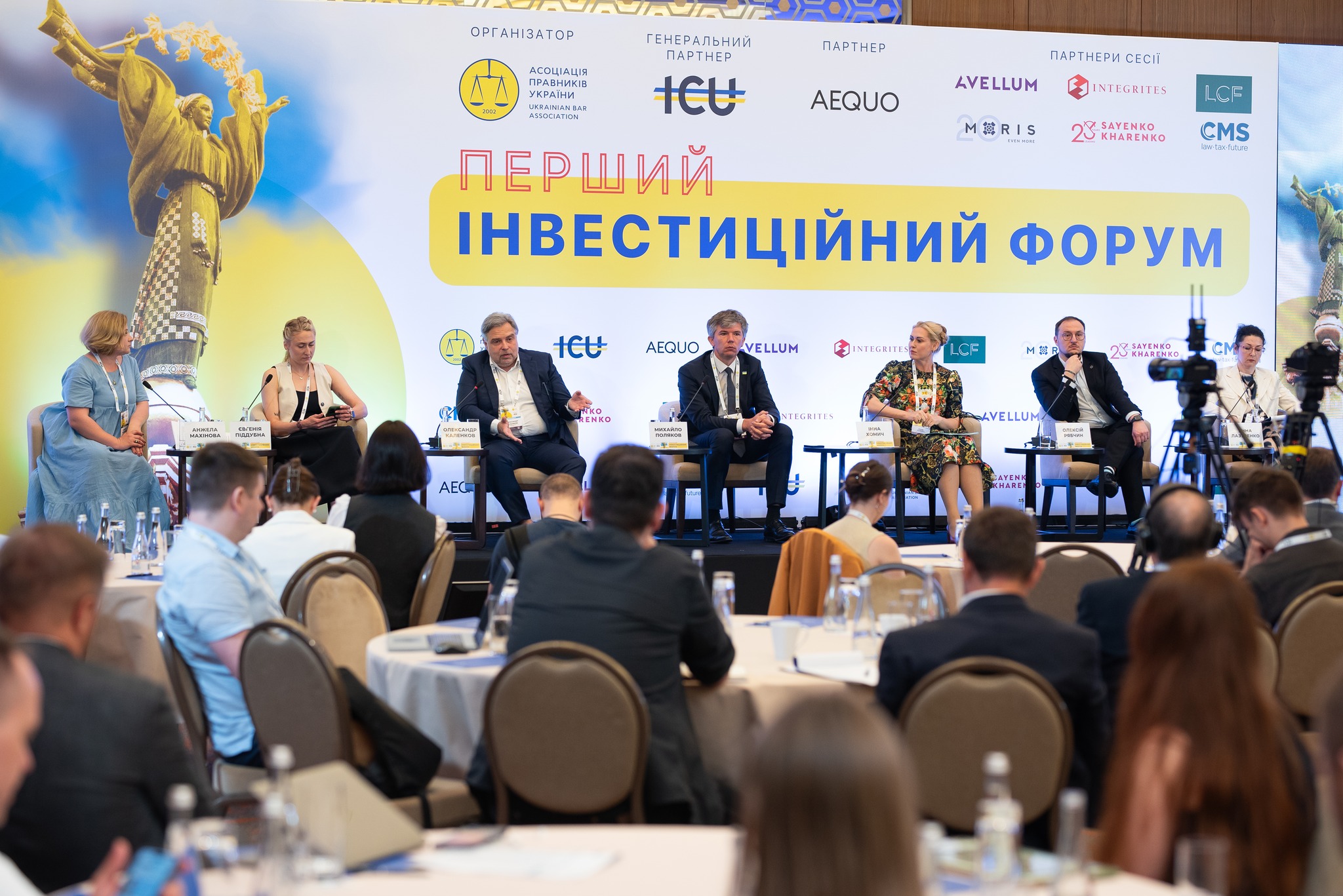
The second session of the Forum was titled "Reforms during the war: what working conditions can businesses expect?". The discussion was moderated by Andriy Reun, Partner at LCF Law Group.
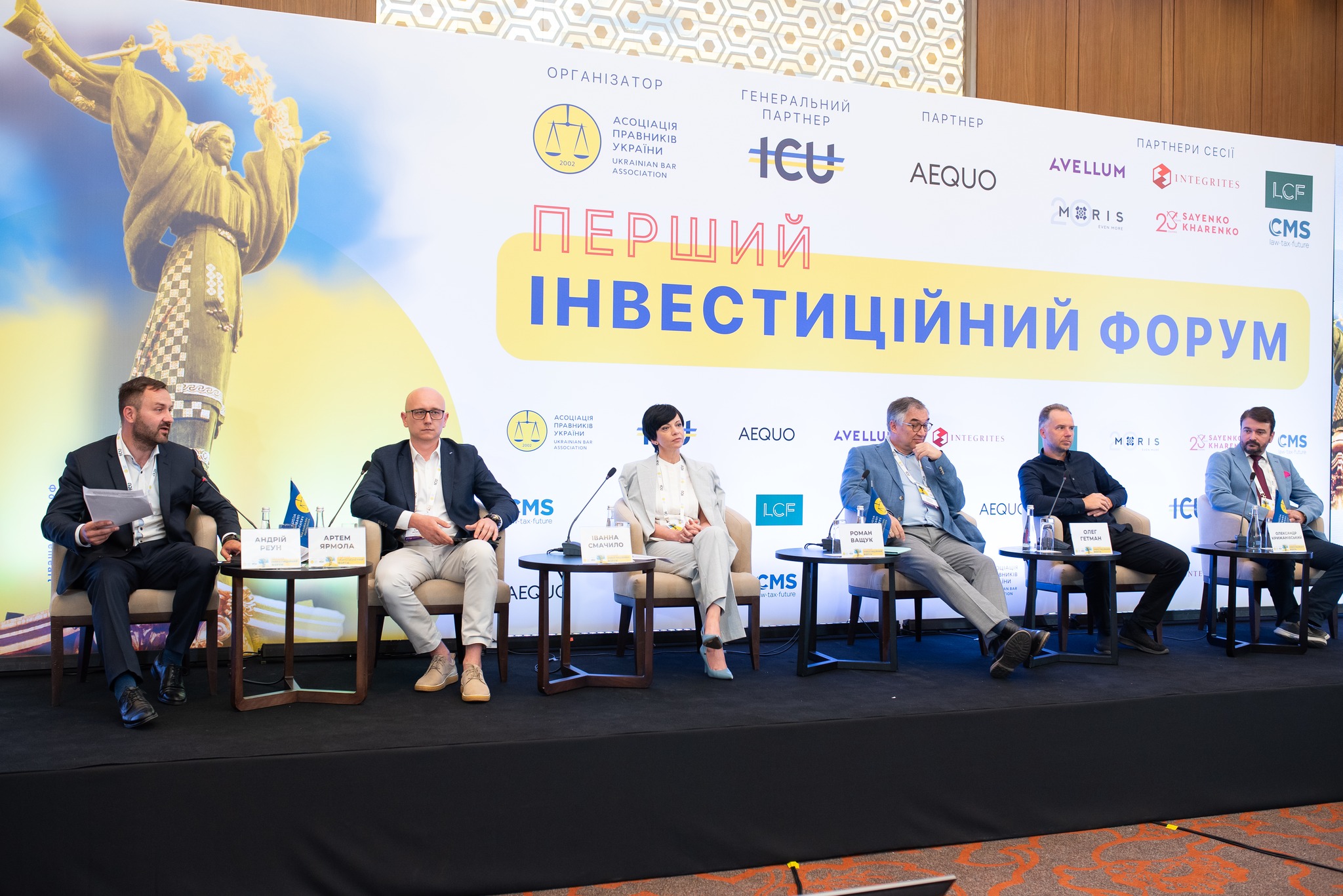
One of the topics of discussion was the incentives and expectations of businesses investing in Ukraine under the conditions of full-scale war. Speakers discussed issues such as pressure from government institutions, the lack of effective dialogue between business and the state, and corruption risks in their relationships.
Oksana Myronko, Head of Communications at the European Business Association, and Roman Waschuk, Business Ombudsman, shared their thoughts on these issues. Mr. Waschuk also mentioned that the Business Ombudsman's Council has prepared a declaration on fair and reasonable administration containing 12 points.
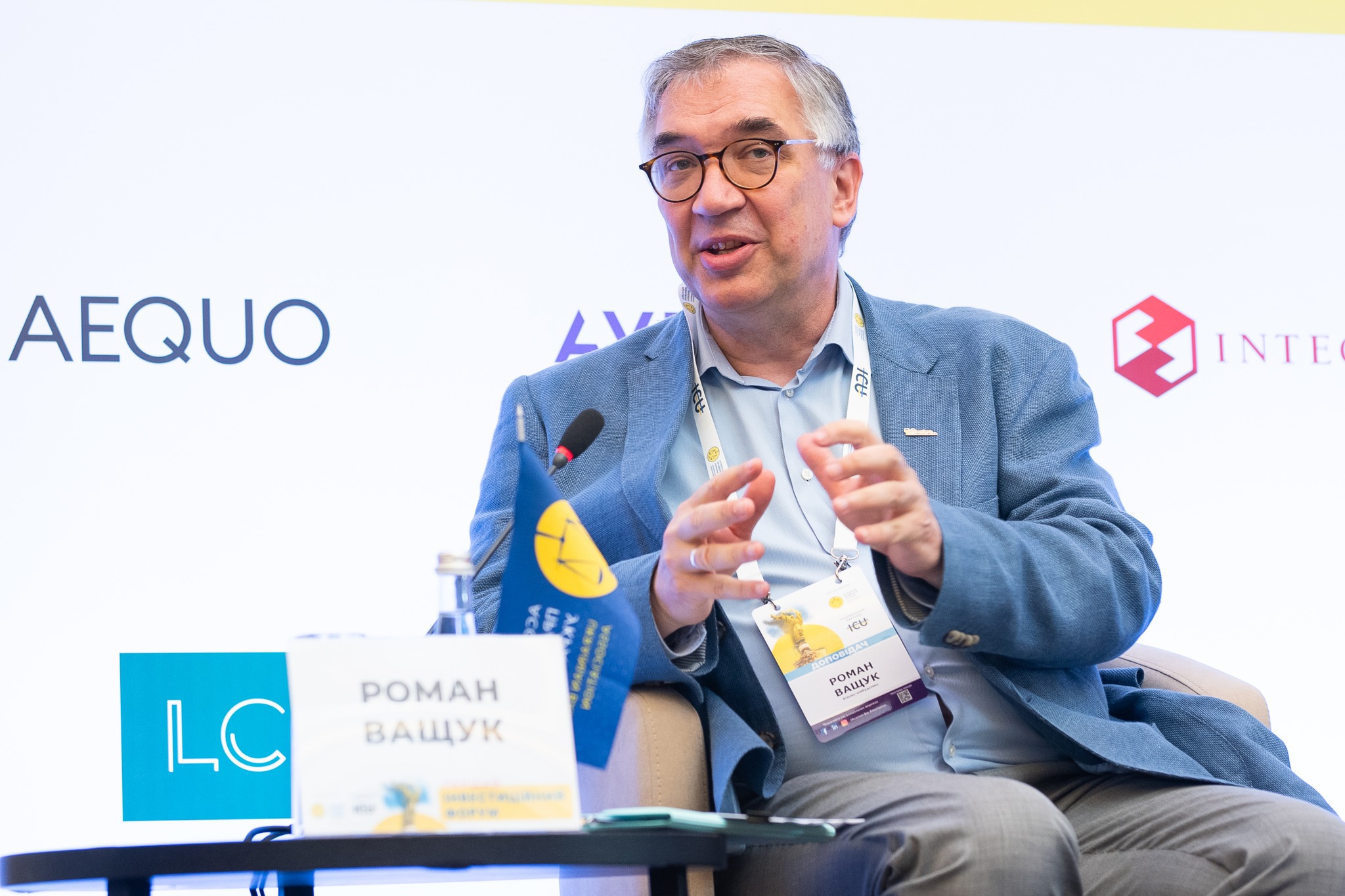
Oleg Hetman, Coordinator of the Expert Groups of the Economic Expert Platform, and member of the Supervisory Board of the Ukrainian Business Council, focused on the new tax system proposed by the Ministry of Finance of Ukraine in the controversial National Revenue Strategy for 2024-2030 (NRS). He stated that experts have analyzed the NRS and expressed their comments to the government. He recalled that the Ministry of Finance developed the strategy without any consultations with the public or businesses.
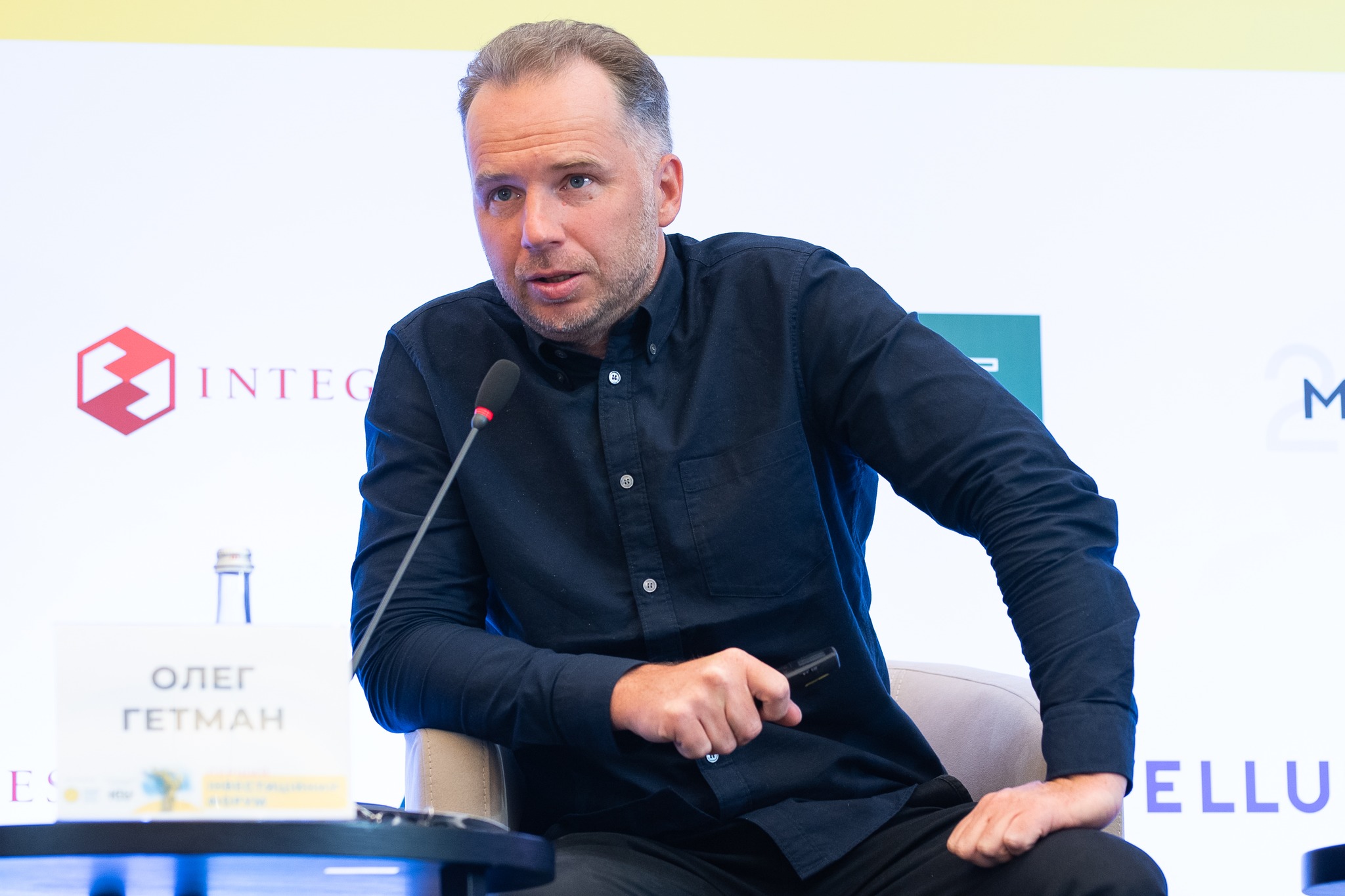
Mr. Hetman believes that the strategy should not be implemented as it would worsen the investment climate in Ukraine. He called on businesses, lawyers, and other stakeholders to unite and ensure that the NRS remains just on paper.
Artem Yarmola, Deputy Director of the Legal Department at FOZZY GROUP, shared his thoughts on whether customs system reforms would simplify business operations. He emphasized the need to punish dishonest businesses for violating customs rules.
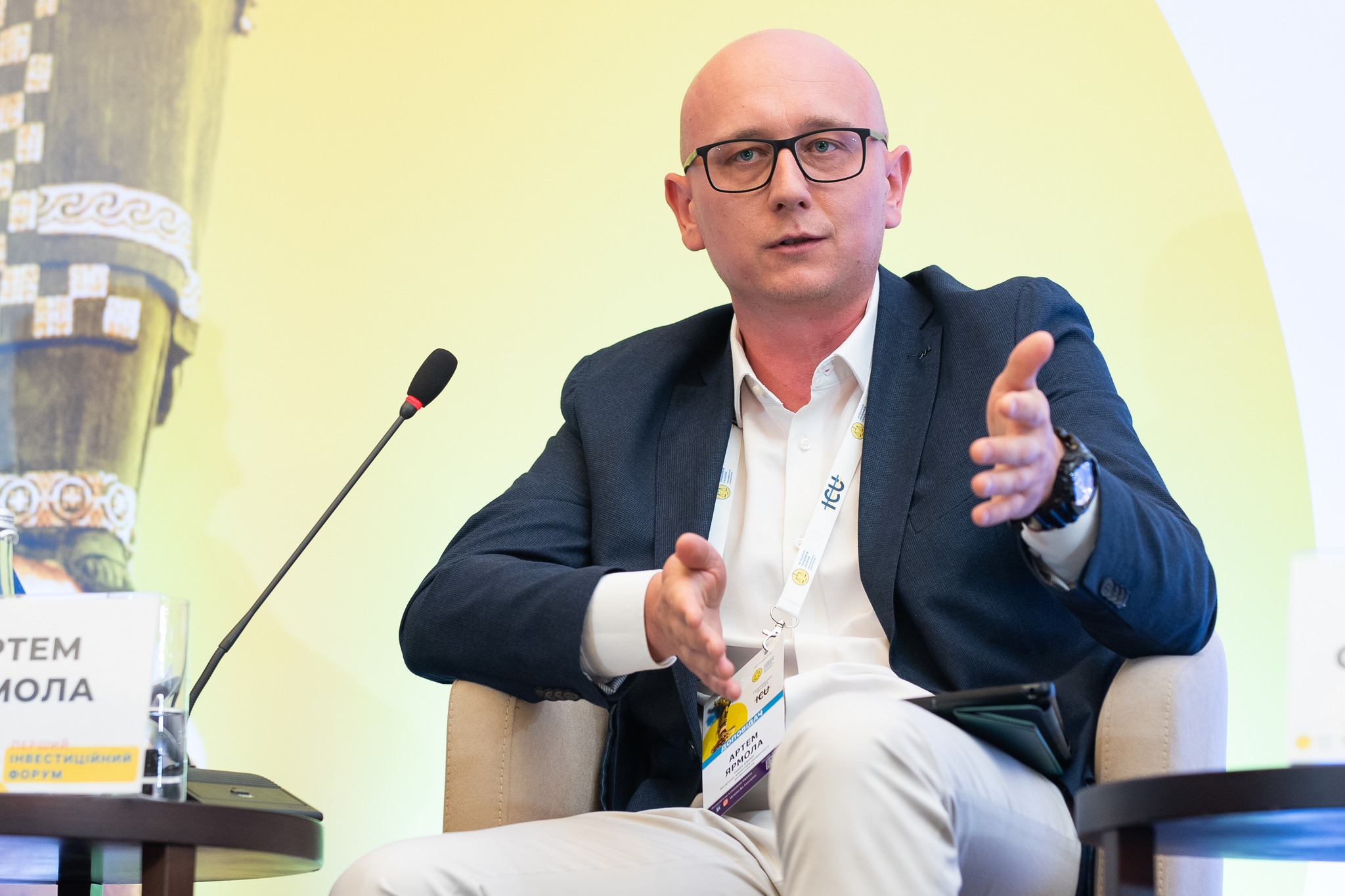
Oleksandr Kryzhanivskyy, Director at Universal Insurance Brokers and Consultants LLC, spoke about the prospects of war and political risk insurance in Ukraine and the opportunities for foreign and national investors in this sector.
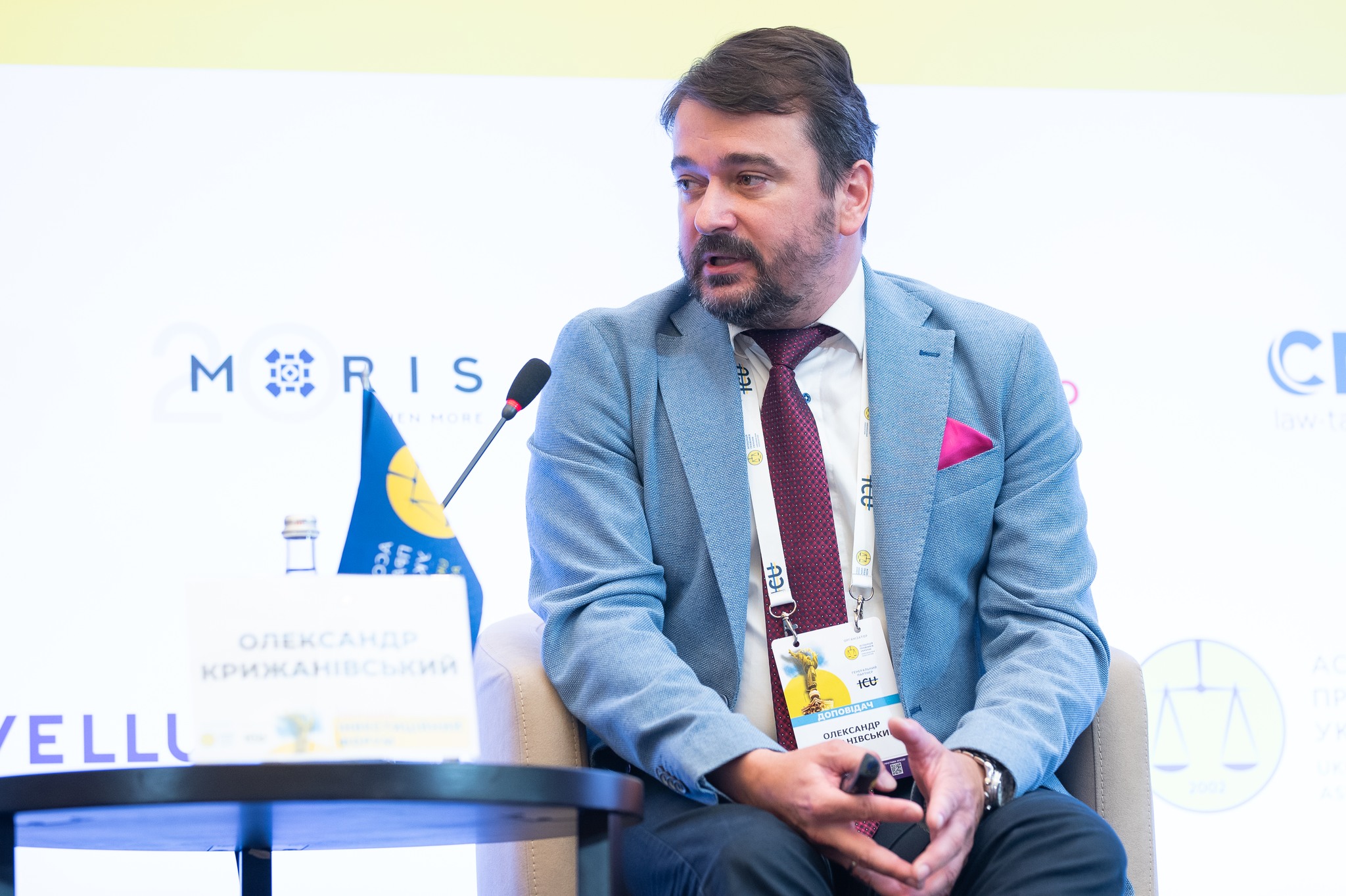
Ivanna Smachylo, Deputy Chair of the State Property Fund of Ukraine, outlined privatization issues in her speech. She stated that Ukrainian businesses are mainly interested in acquiring property complexes and production facilities, while foreign investors are interested in large privatization objects. She added that in the summer of 2024, "large privatization will be a priority."
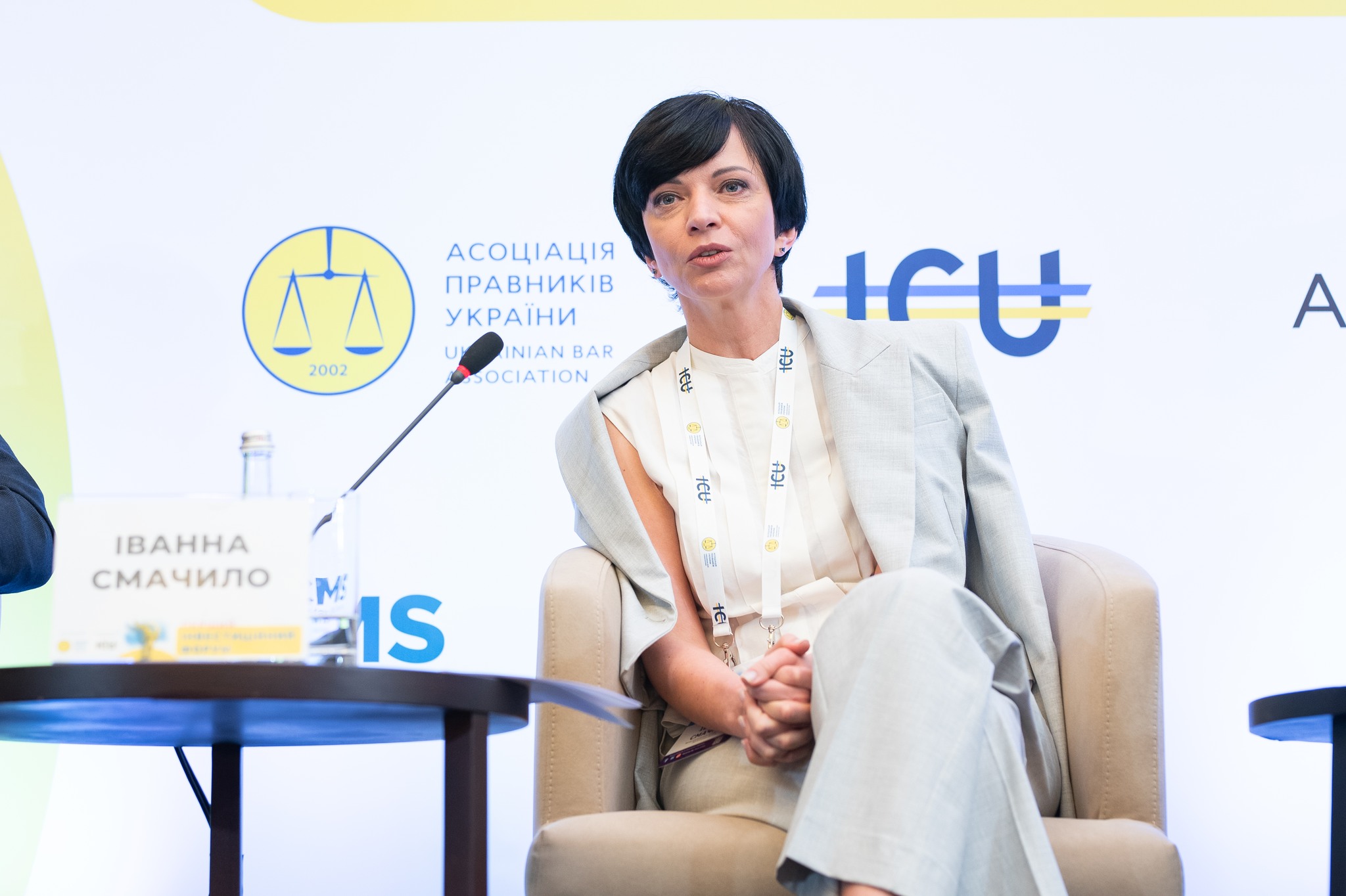
Ms. Smachylo also announced that in July 2024, the first 108 hectares of state land would be put up for sale on Prozorro.Sale.
During the break between sessions, there was a presentation of the book "Unbreakable Business," dedicated to the work of Ukrainian businesses during the war. The co-authors of the book are Oleksandr Golizdra, beneficiary of the communication agency “Market.Info”, Сhairman of the committee of the Public Council at the Bucha District State Administration, and Sergiy Shevchenko, Director of the communication agency "Market.Info."
Presenting the book, Mr. Shevchenko noted: "This book is a chronicle of Ukrainian business during the war. It contains unique experiences of companies in strategically important industries: energy, pharmaceuticals, banking, and food sectors. Well-known brands and market leaders."
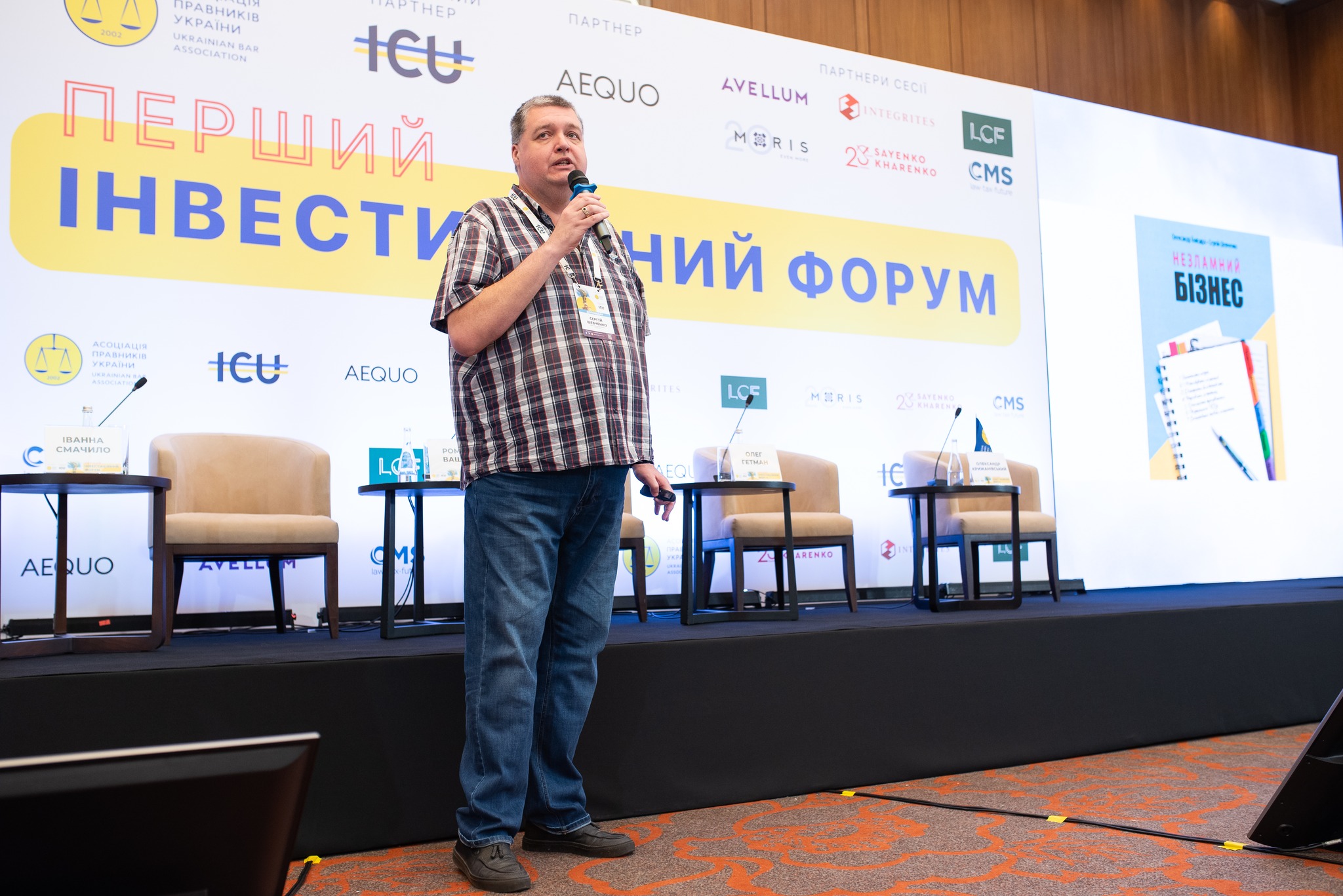
The book describes the general priorities of Ukrainian businesses during the war, work planning and strategy changes, unique cases, and emotional stories. It can be purchased on the “Summit Knyga” publishing house’s website.
The First Investment Forum continued in the format of parallel sessions dedicated to the issues of specific sectors of the Ukrainian economy.
For example, participants of the session "Challenges and opportunities in the agricultural sector" discussed investments in the sector during the war. The panel was moderated by Maryan Martynyuk, Senior Partner at MORIS.
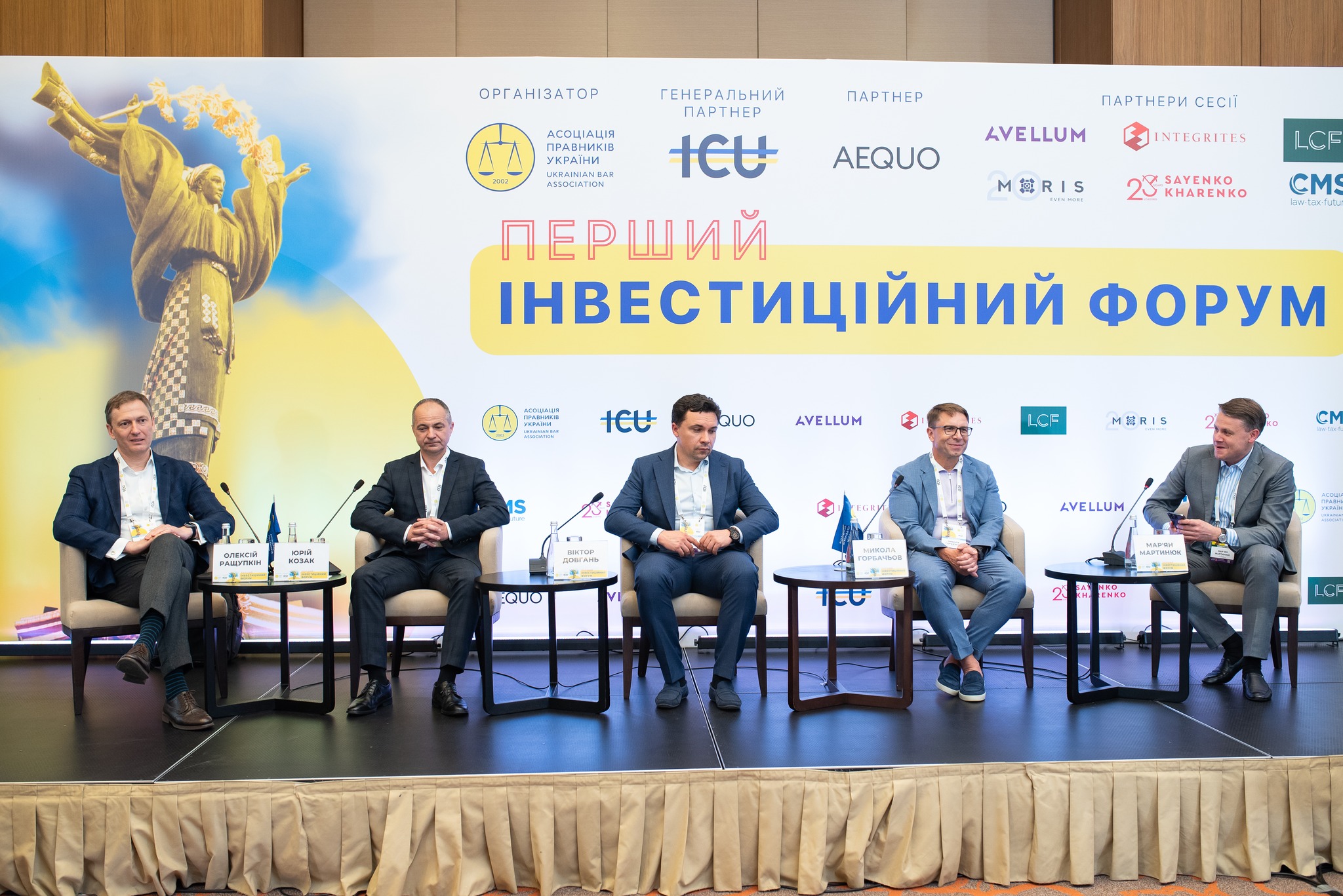
The discussion topics included:
- Investments in the industry during wartime. What are the key players betting on?
- Logistics under blockade conditions. New challenges and adaptation to difficulties.
- Fundraising engagement.
- Technologies in Agriculture. What will help the sector become more efficient?
Experts shared their thoughts on the challenges and opportunities currently existing in Ukraine's agricultural sector. Mykola Gorbachov, President of the Ukraine Grain Association (UGA), noted: "Farmers continue to work. However, the most pressing challenge is that 6 million hectares are mined. Tragedies often occur. It will take over 700 years to clear the mines. And without business, demining will not happen."
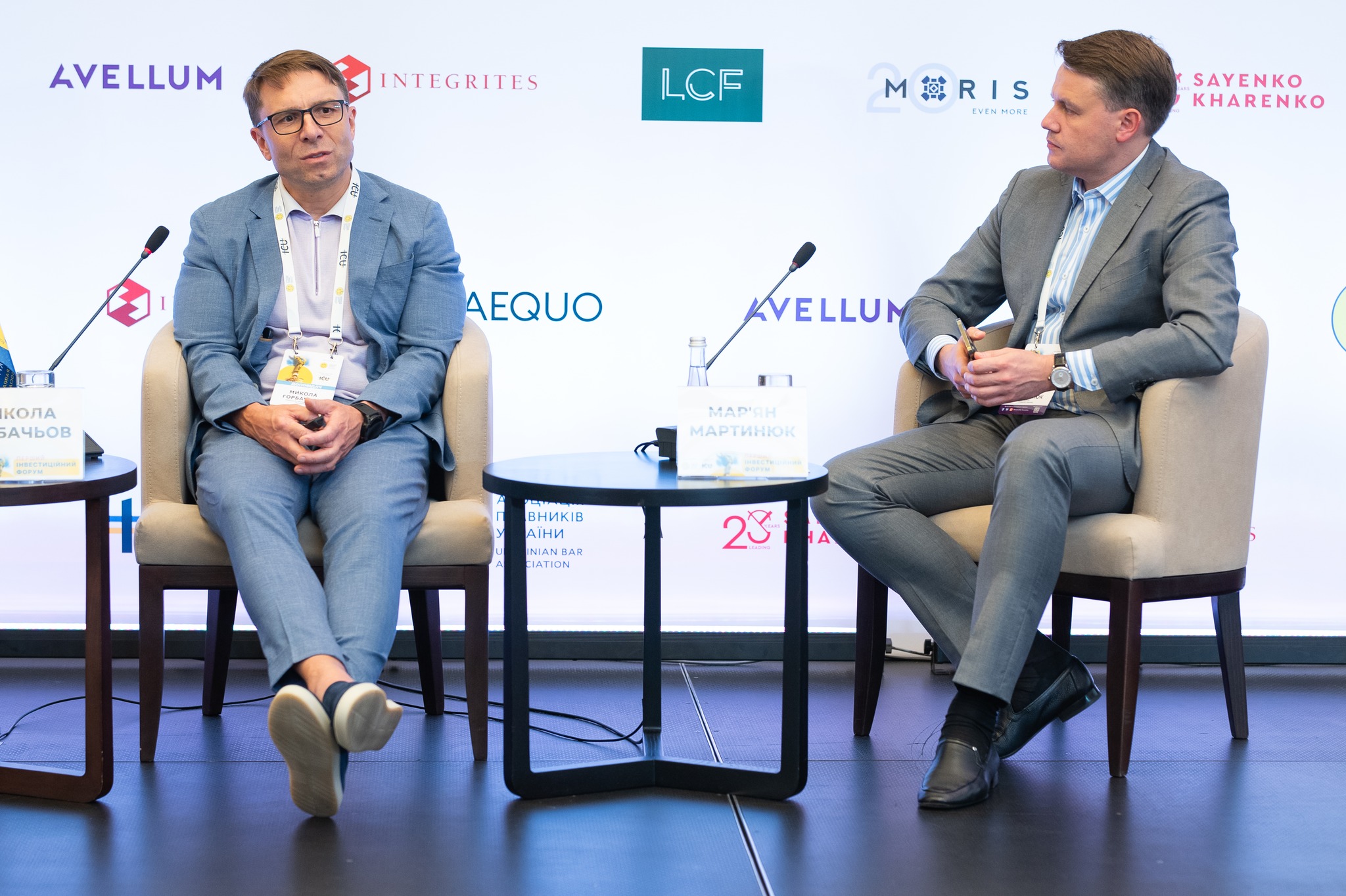
Mr. Gorbachov believes that business will bring solutions and technologies, and it will be investment-attractive due to programs and compensations from the government. "Only in this understanding will we be able to overcome the problem of demining our land," concluded the UGA President.
This view was continued by Viktor Dovhan, Deputy Minister of Infrastructure of Ukraine in 2016-2019, Advisor to Upper Silesian Fund FGSA. He noted that the most pressing issues now are export logistics.
"The best investor in agricultural export logistics is the Armed Forces of Ukraine. When we regained control of our part of the Black Sea, we immediately received 50 million tons of export through the ports," noted Mr. Dovhan.
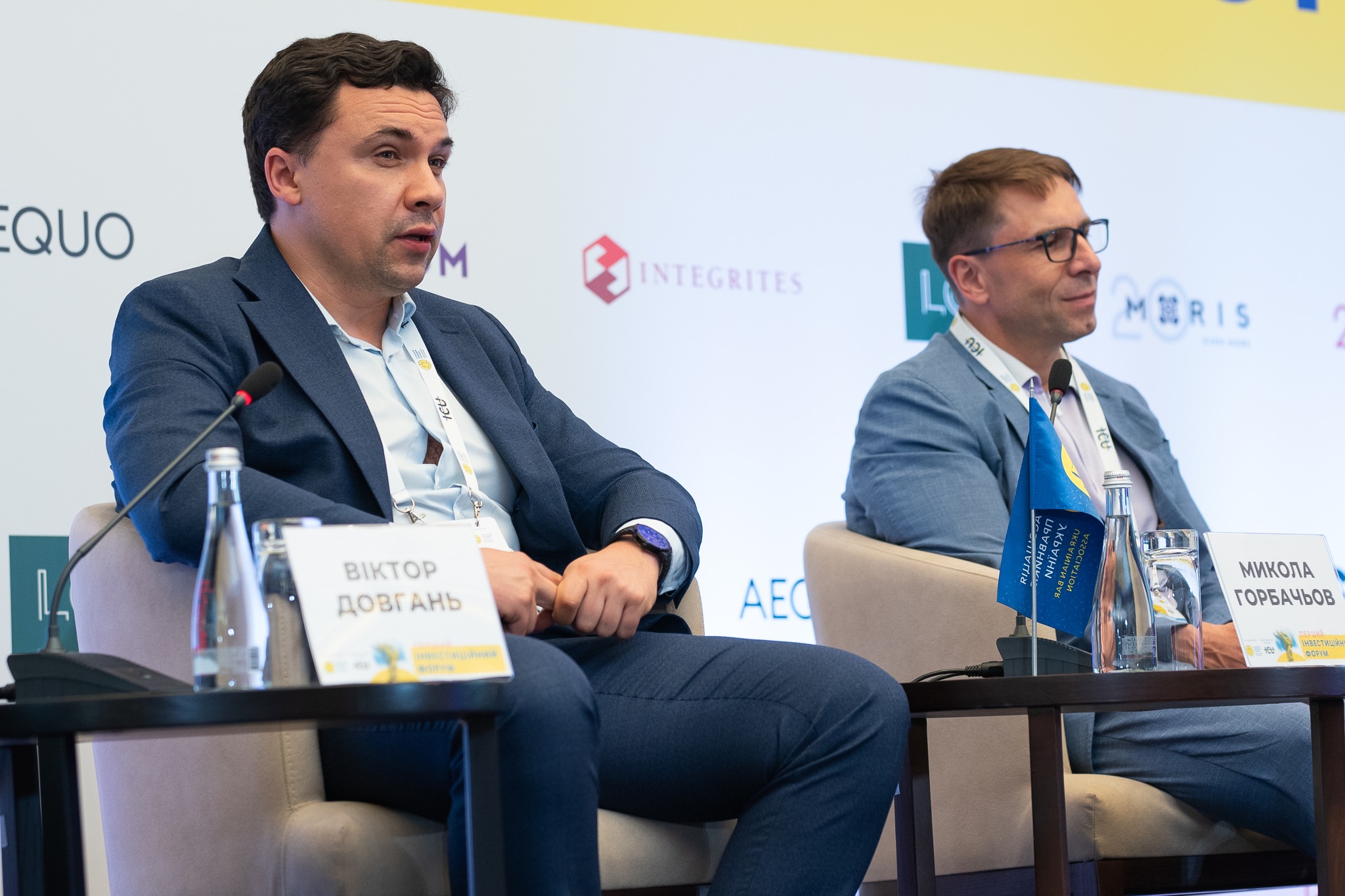
According to him, the government understands the need for investments, and many mechanisms are being prepared to compensate for investments in infrastructure, industrial park models, and road construction. It is evident that the energy sector will require the most investments, but railway logistics projects of Ukrzaliznytsia are already needed, as well as planning for air logistics when the "sky opens," emphasized Viktor Dovhan. He added that these projects are elements of Ukraine's EU integration.
Yurii Kozak, Director of the Large Corporate Clients Department at JSC Raiffeisen Bank, continued the topic of investing in the agricultural sector. "Agriculture is the main source of foreign currency for the country. This sector has shown the most resilience and adaptability. At the beginning of the war, banks had to endure, and now we need to think about investing. For example, in new production, in agro-industrial processing plants, in investing in small generating capacities for the agricultural sector," noted the speaker.
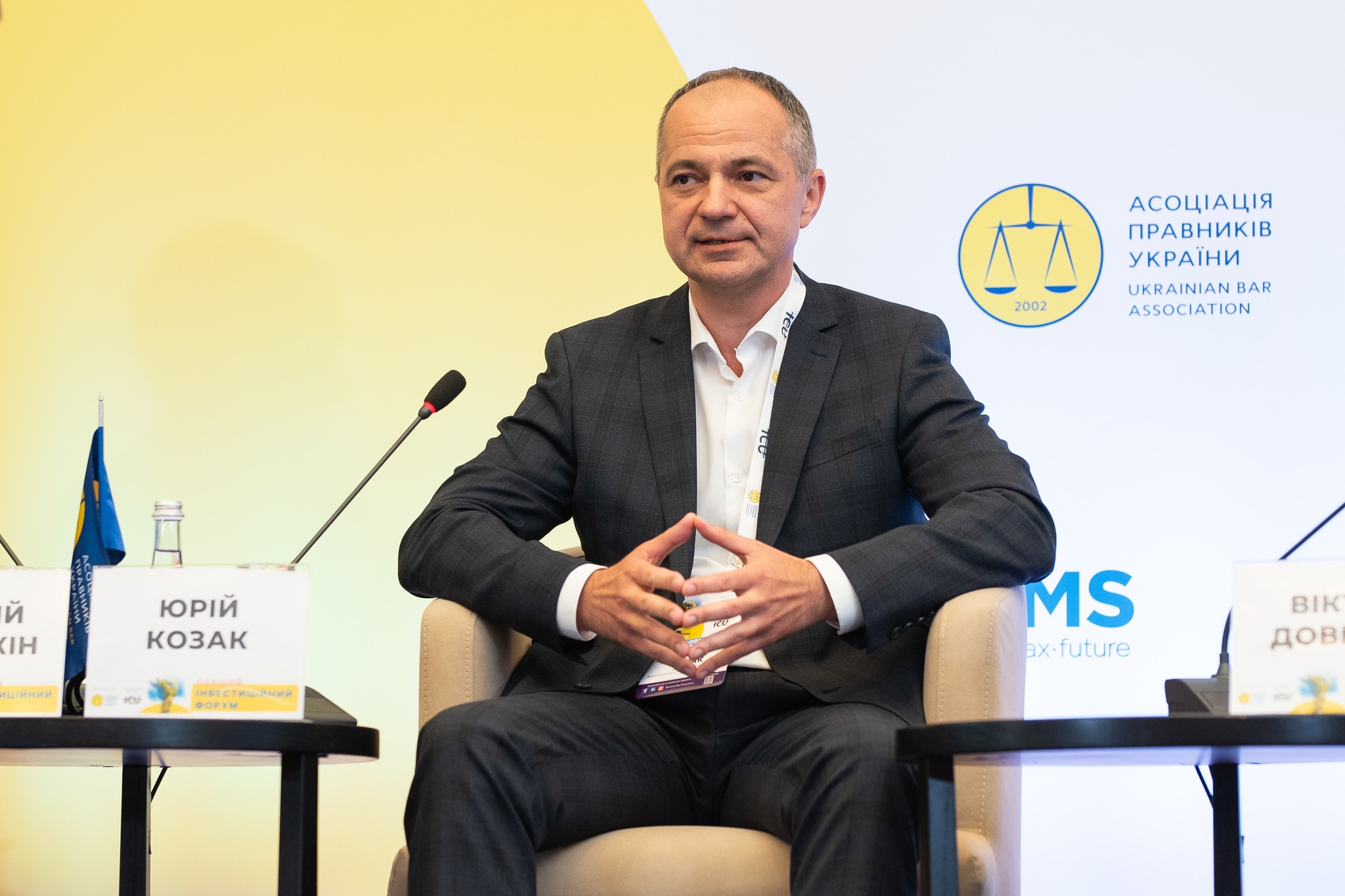
Oleksii Rashchupkin, Managing Partner at Altius Capital, remarked that 90% of investments in the agricultural sector are domestic investments. According to him, this happens due to the critical issue of the land market: the specific feature of Ukrainian agriculture is leased land, not owned. This is a very unclear instrument for foreign investors, which is why Ukraine lacks large capital investments in this sector, explained Mr. Rashchupkin.
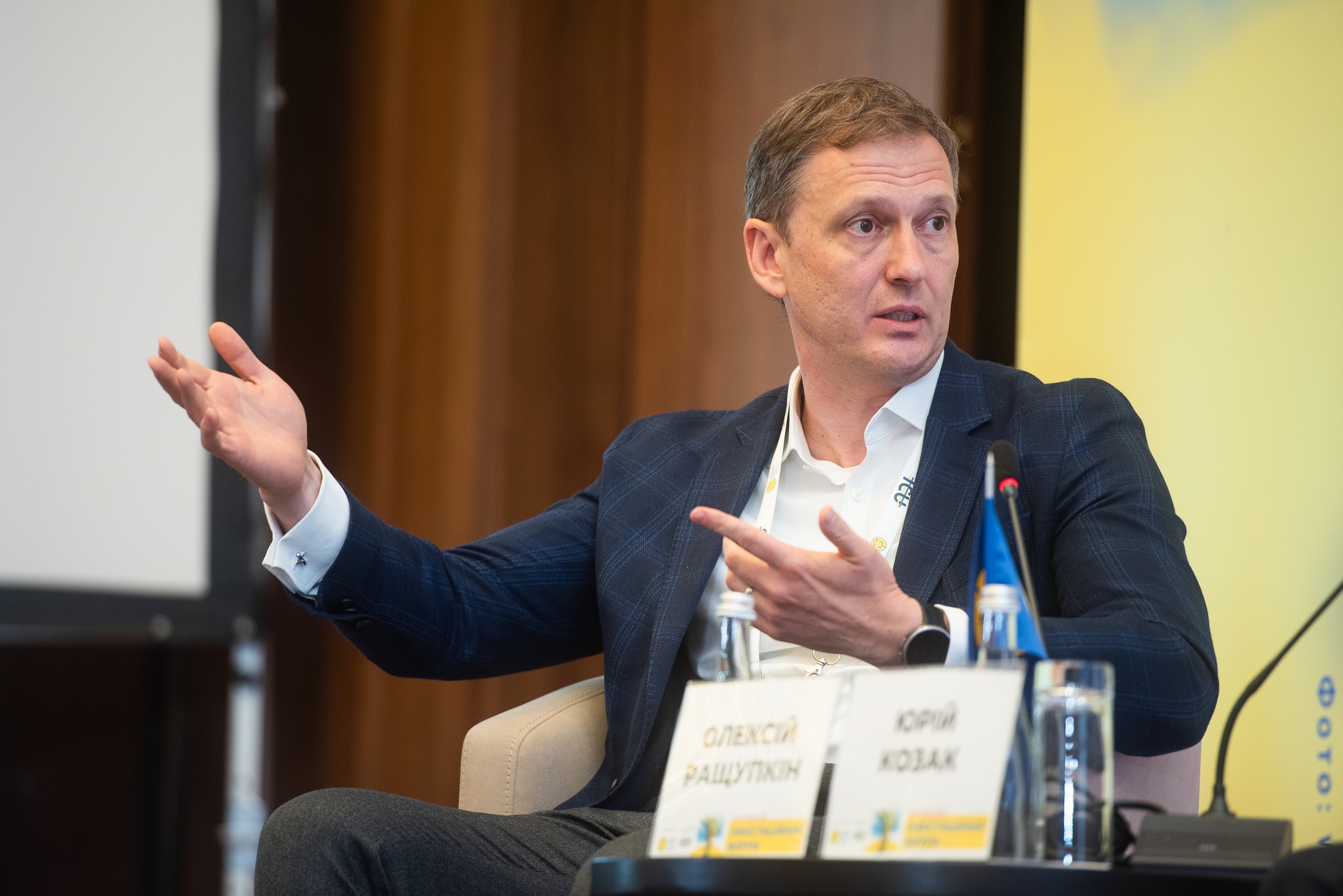
Overall, session participants agreed that the challenges also point to vast opportunities for investing in Ukraine's agricultural sector.
Another parallel session of the Forum was dedicated to the challenges and opportunities in natural resource extraction. The session was moderated by Maksym Maksymenko, Partner at AVELLUM, Head of Real Estate and Infrastructure.
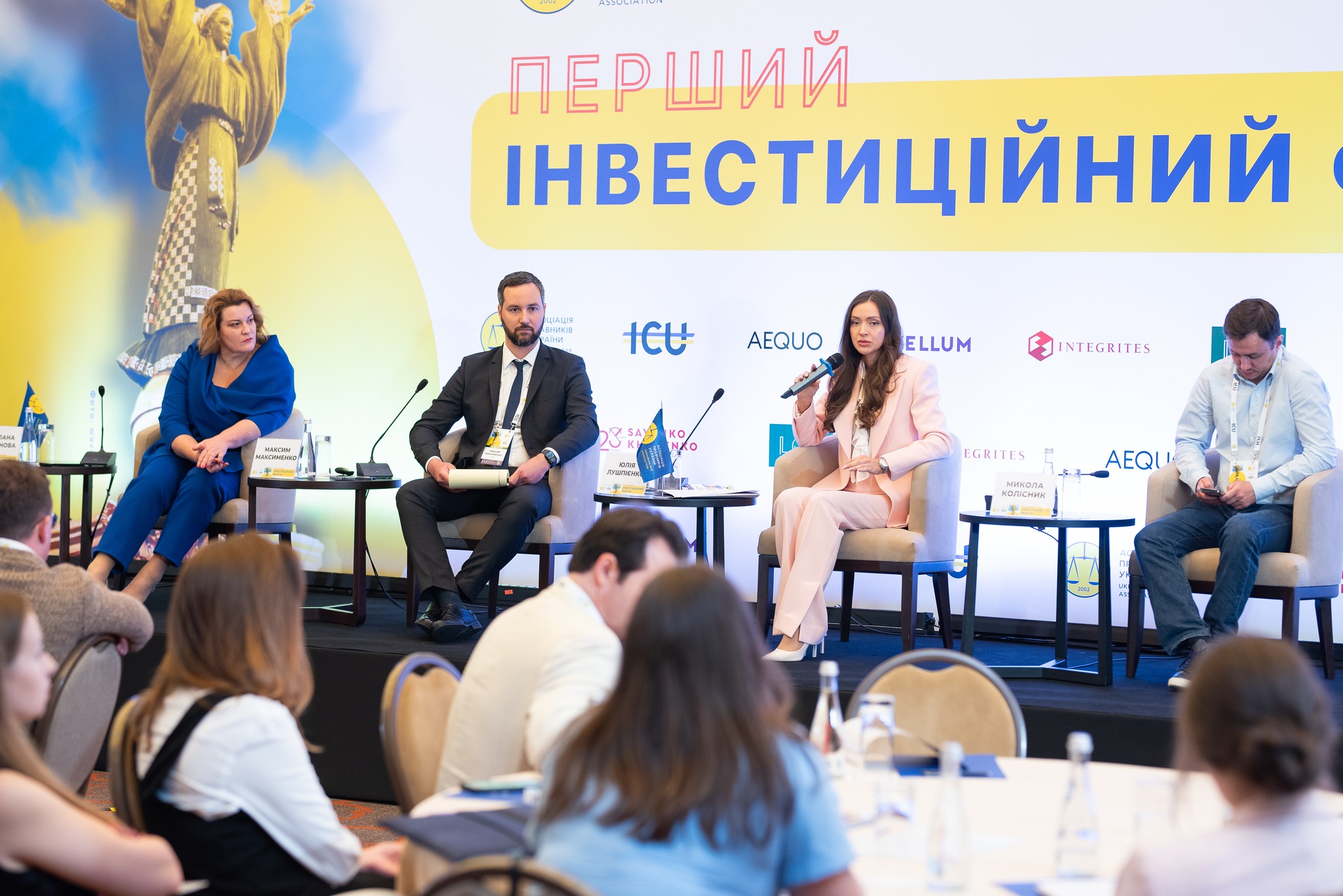
The discussion included:
- Mykola Kolisnyk, Deputy Minister of Energy of Ukraine;
- Yuliia Borzhemska, Regulatory Policy Manager at DTEK Naftogaz;
- Yuliia Lushpiienko, Head of legal (Mining projects) at BGV Group;
- Svitlana Romanova, Chief Legal Officer at Metinvest Holding.
Among other things, the speakers discussed the issue of reviving the extraction industry amidst the full-scale war and governmental support for it. Specifically, Yuliia Lushpiienko and Mykola Kolisnyk debated the possibility of creating industrial parks for the extraction sector.
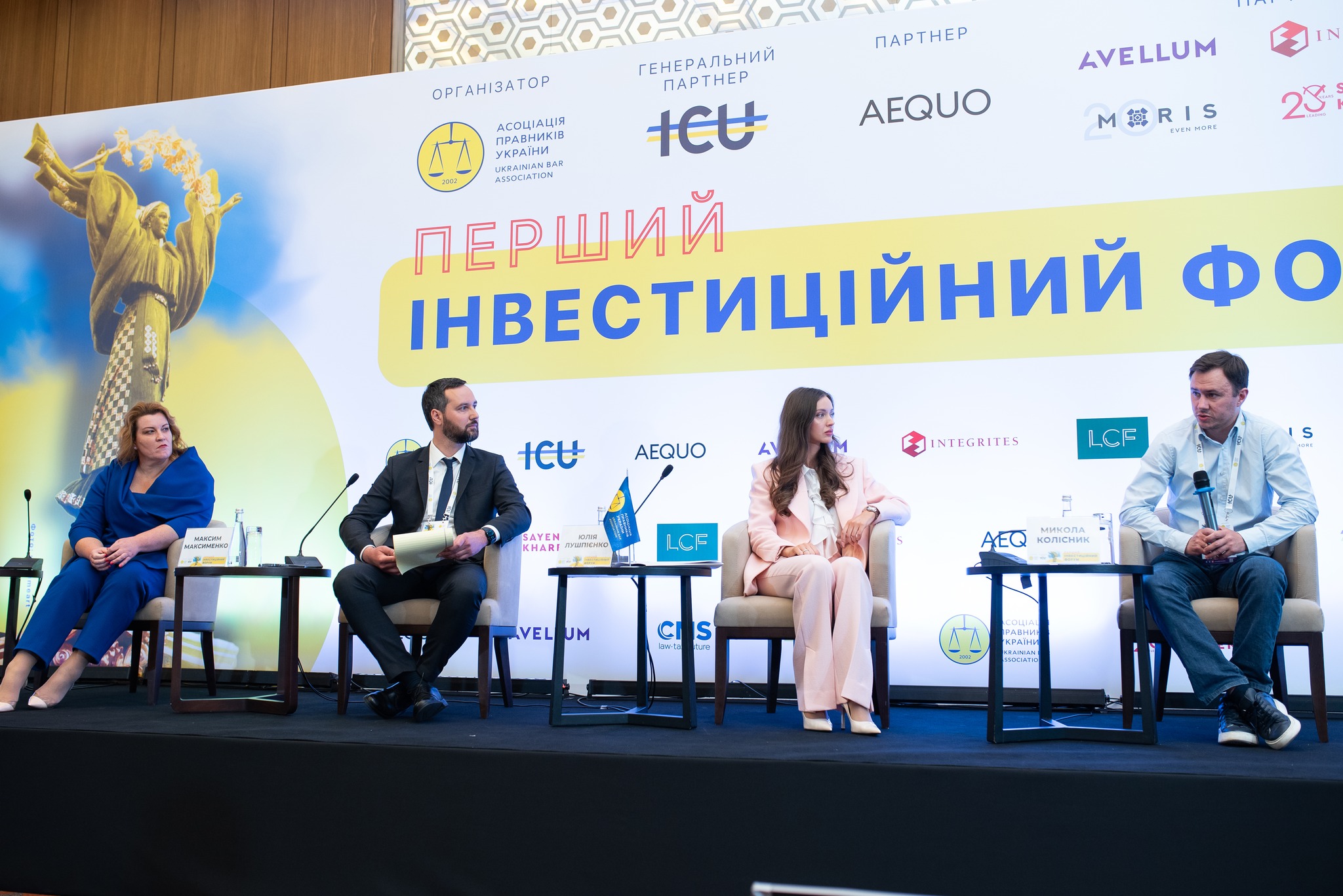
Svitlana Romanova talked about the challenges and opportunities in the field of natural resource extraction. According to her, these include:
- problems with regulating the volume of mineral extraction during martial law;
- the need to update and revise specialized regulatory acts;
- waste management issues.
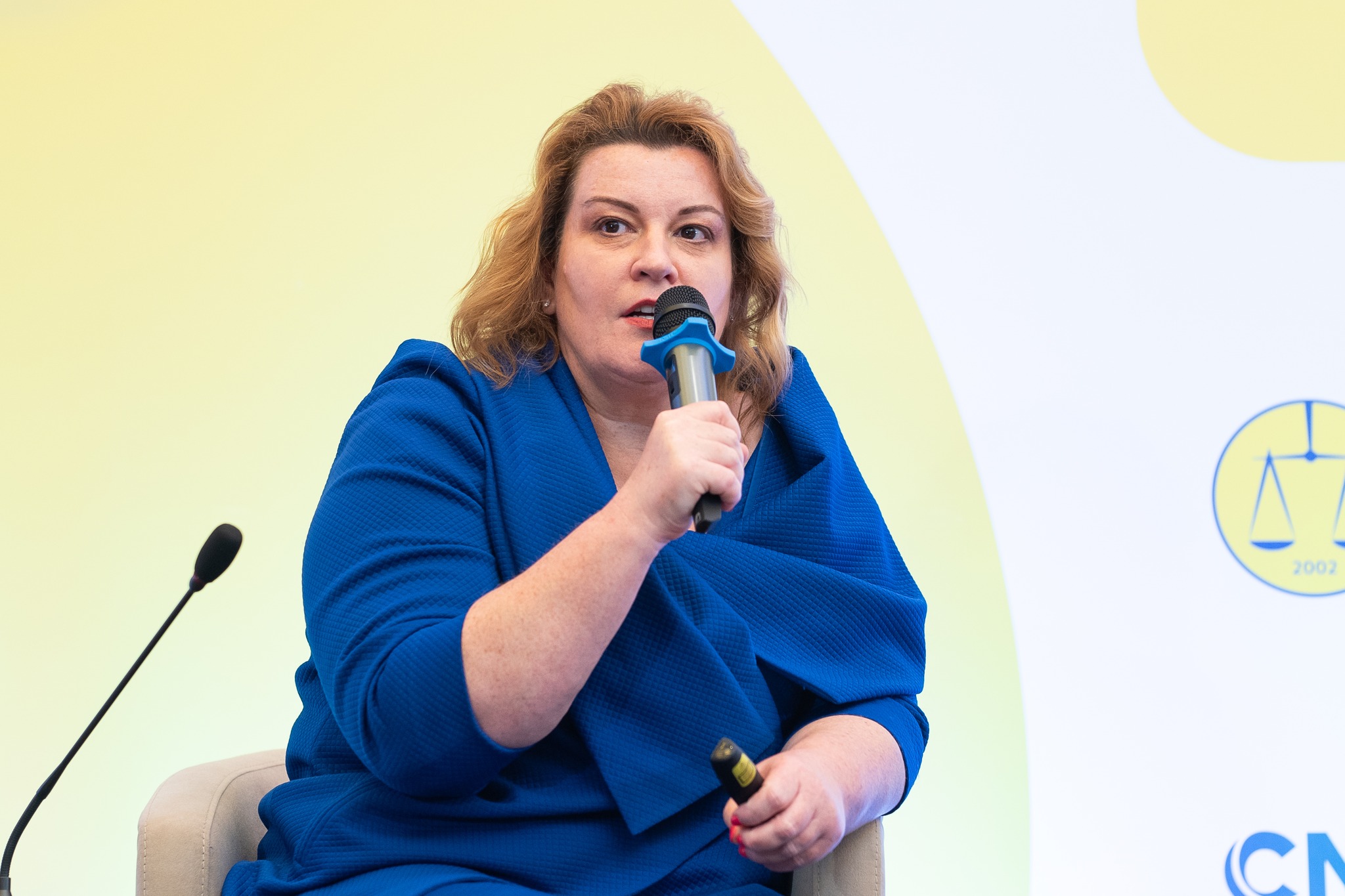
According to Ms. Romanova, Ukrainian businesses have demonstrated the ability to adapt to extremely challenging conditions, but unfortunately, national legislation is not as flexible.
Yuliia Borzhemska delivered a report on "Current Regulatory Issues in the Oil and Gas Extraction Sector". Among other things, she addressed the implementation of production-sharing agreements and current issues in the natural gas market (such as the implementation timelines of REMIT, etc.).
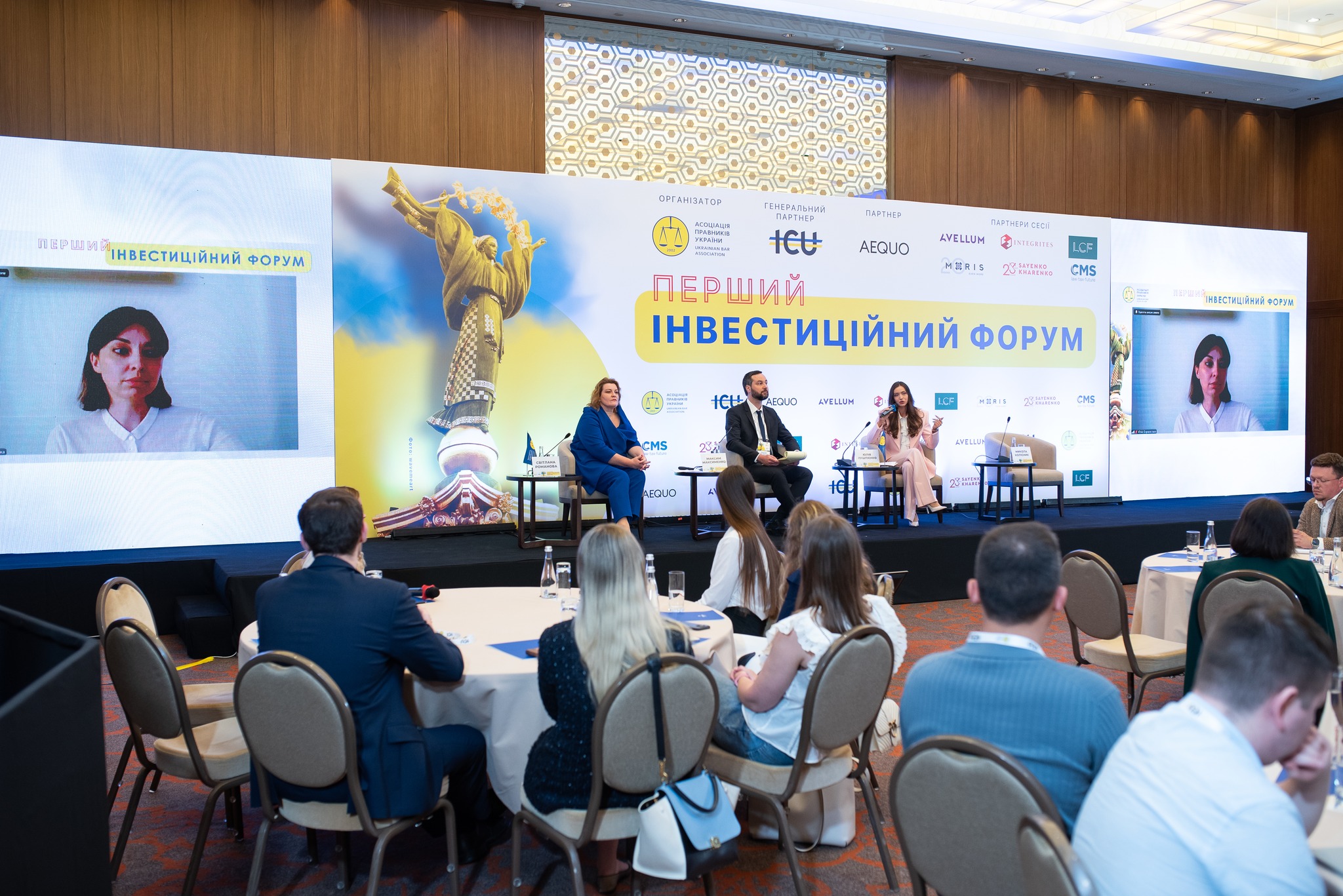
"Challenges and opportunities in the energy sector" was the topic of another parallel session of the First Investment Forum. The discussion was moderated by Oleksiy Feliv, Managing Partner at INTEGRITES.
Volodymyr Kudrytskyi, Head at Ukrenergo, stated that due to the intense attacks by Russian terrorists on power plants, Ukraine is forced to transition from traditional to "green" generation. "What should replace fossil energy generation? The generation mix — highly maneuverable gases, wind and sun, biomass and biogas technologies," noted the speaker.
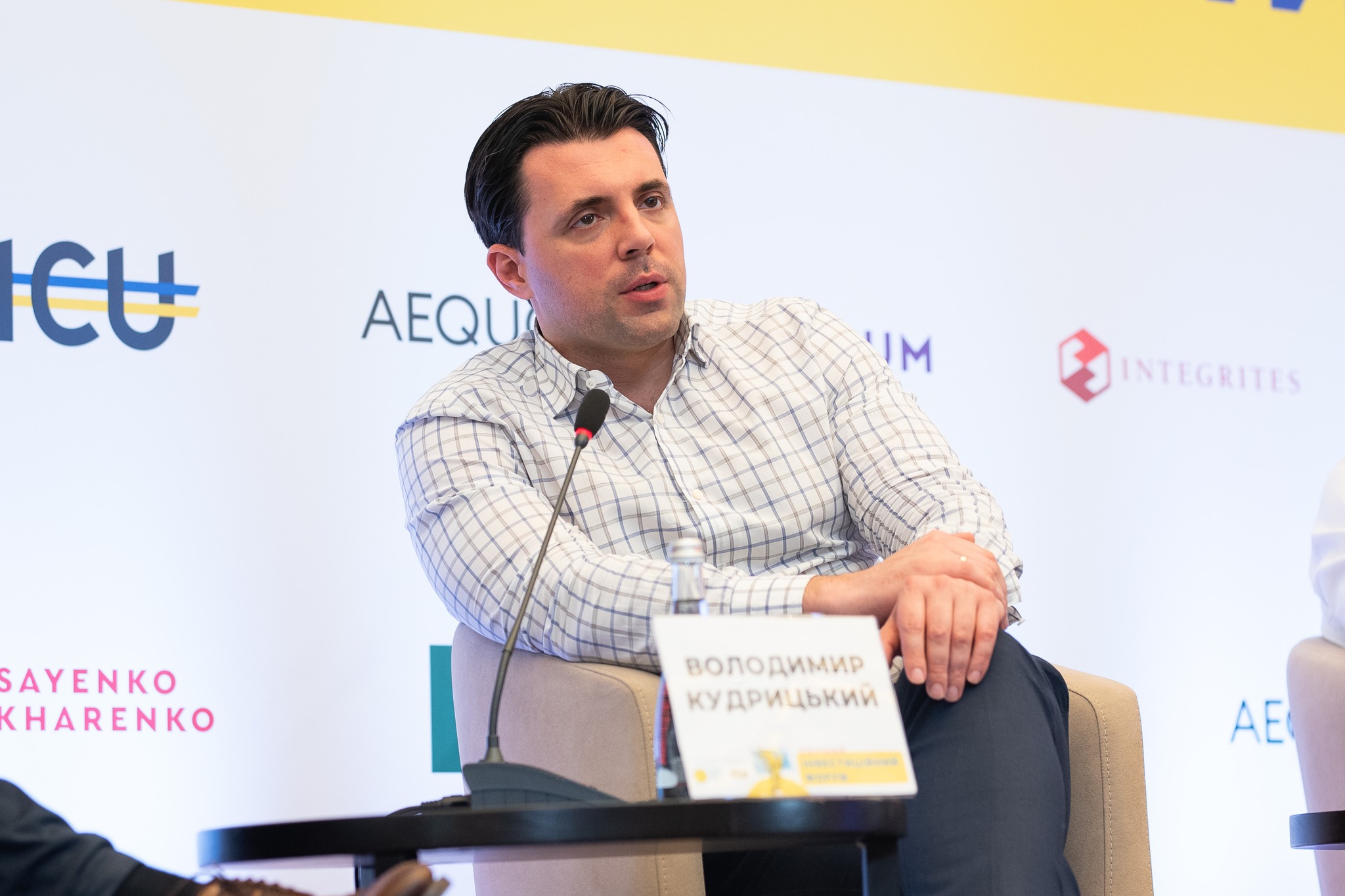
Speaking about the role of the government in the energy sector, Mr. Kudrytskyi urged avoiding obstruction, additional regulation, and the creation of extra state institutions. "The government must complete the regulatory package and contracts and clearly define the rules of credit financing," added the Head at Ukrenergo.
Olga Kovalchuk, Head of Finance and Investment at Goldbeck Solar, a solar generation giant that entered Ukraine during the war, shared international experience: "Projects and investments must be guaranteed by insurance projects. There should be appropriate financial structuring and resolution of corporate power purchase agreements (PPAs). It is very important to make amendments to the law on state support for investments, including renewable energy."
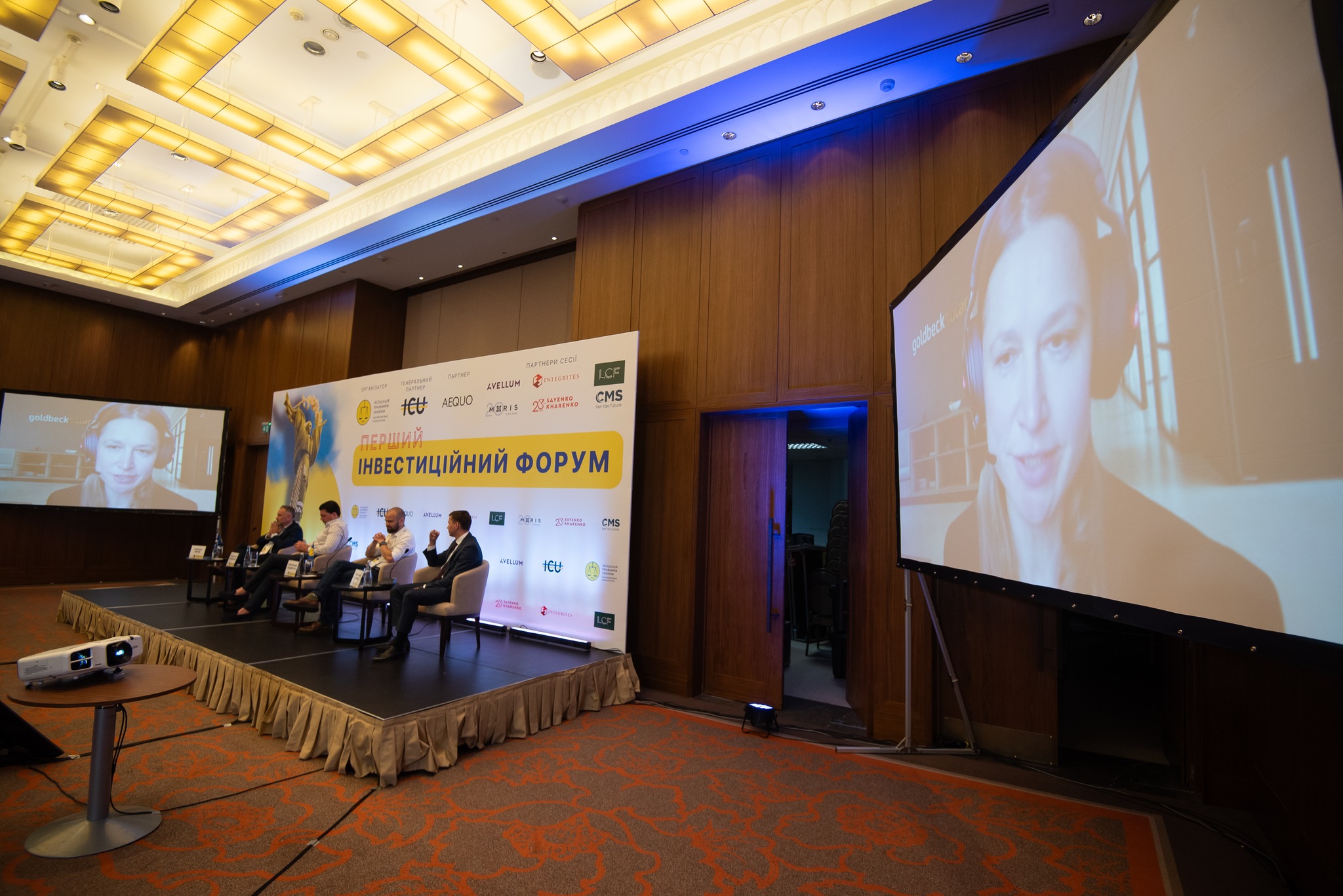
Oleksandr Podprugin, Country Manager Ukraine at Notus Energy, a German developer of generation stations, emphasized the main obstacles and limitations to the large-scale implementation of investment projects:
- the absence of a 'bankability element' — long-term electricity buyout — corporate agreements (PPAs);
- CAPEX of Ukrainian projects is higher than in projects in other countries.
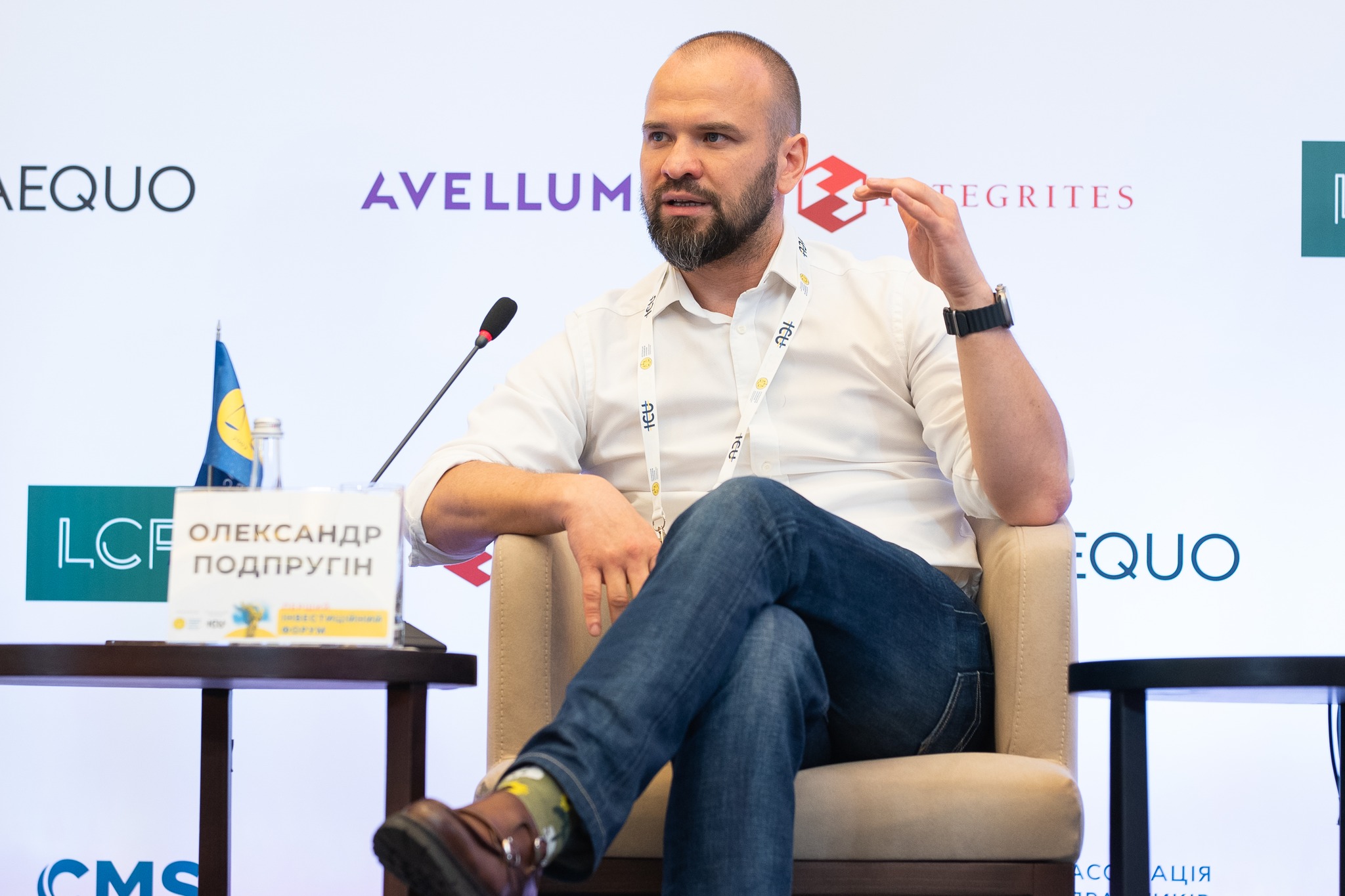
At the same time, he emphasized the readiness of companies to invest and highlighted the need for more intensive work with international financial institutions to resolve investment issues.
Yaroslav Kryl, CEO at Hydrogen of Ukraine LLC, focused on the need to create entire ecosystems for the development of hydrogen projects. He shared experiences of attracting grant projects and creating consortia with international institutions. The speaker also shared thoughts on exploring hydrogen and salt deposits in Ukraine's subsoil.
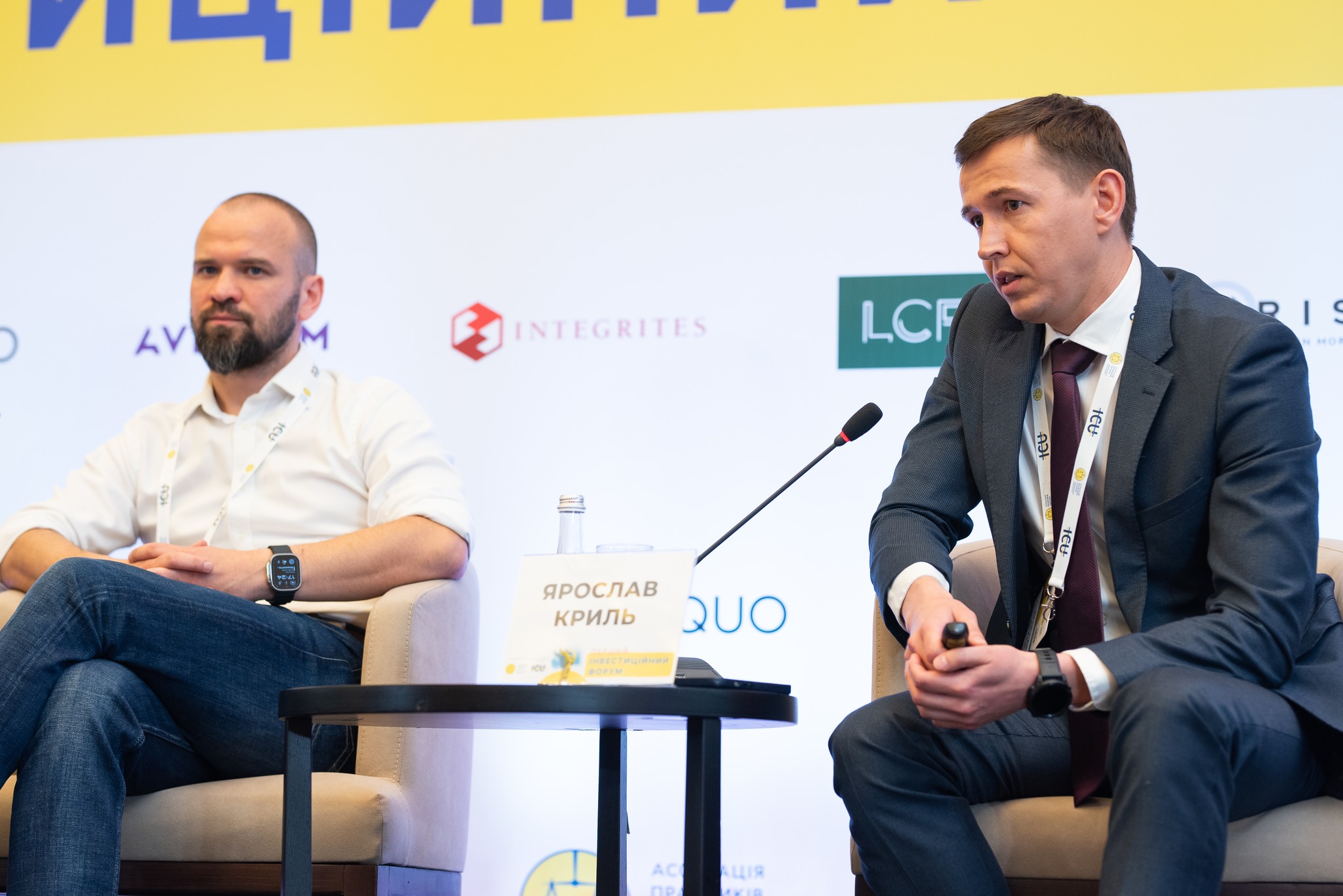
In conclusion, moderator Oleksiy Feliv noted that, unfortunately, due to the full-scale war, Ukraine is forced to make significant technological leaps, but this is being done for our civilized future.
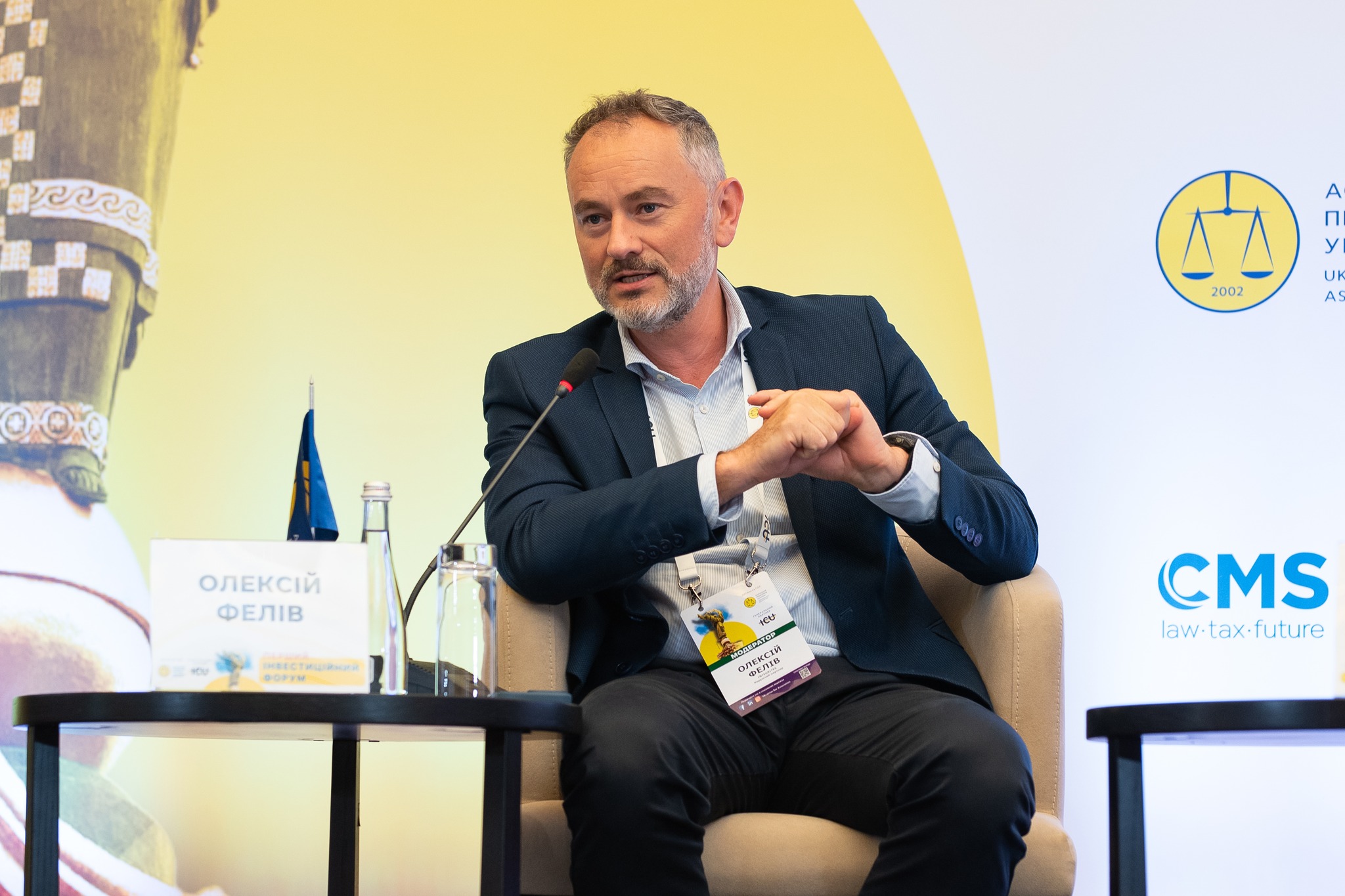
The fourth parallel session of the Forum was dedicated to challenges and opportunities in the defense sector. The discussion was moderated by Michael Lukashenko, Partner at AEQUO.
Participants shared thoughts on the following issues:
- Changes in warfare strategies: new horizons for investors.
- Prospects of Ukrainian defense technologies in the global market.
- Joint ventures and technology transfer: prospects for military production in Ukraine.
- The role of the state in the development of the defense sector: regulator, investor, customer.
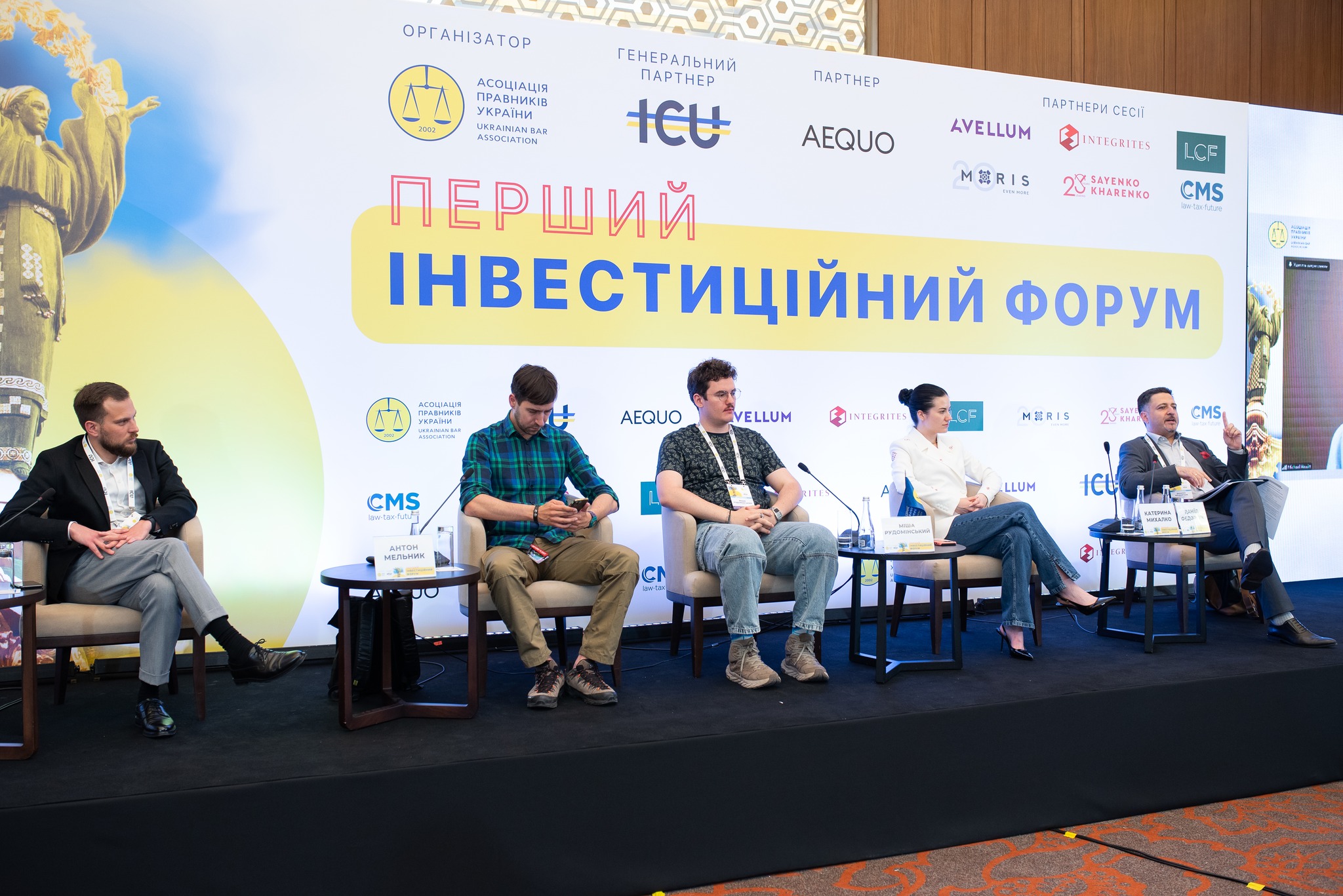
The session experts included:
- Daniil Fedorchuk, Director of the Legal Department at UkrOboronProm, PhD in Law, Associate Professor;
- Michael Hewitt, Rear Admiral (Ret.) U.S. Navy, Co-Founder and CEO of IP3;
- Anton Melnyk, Founding Partner, Executive Director at MITS Capital;
- Kateryna Mykhalko, Director-General at Tech Force in UA;
- Misha Rudominski, Co-Founder at Himera.
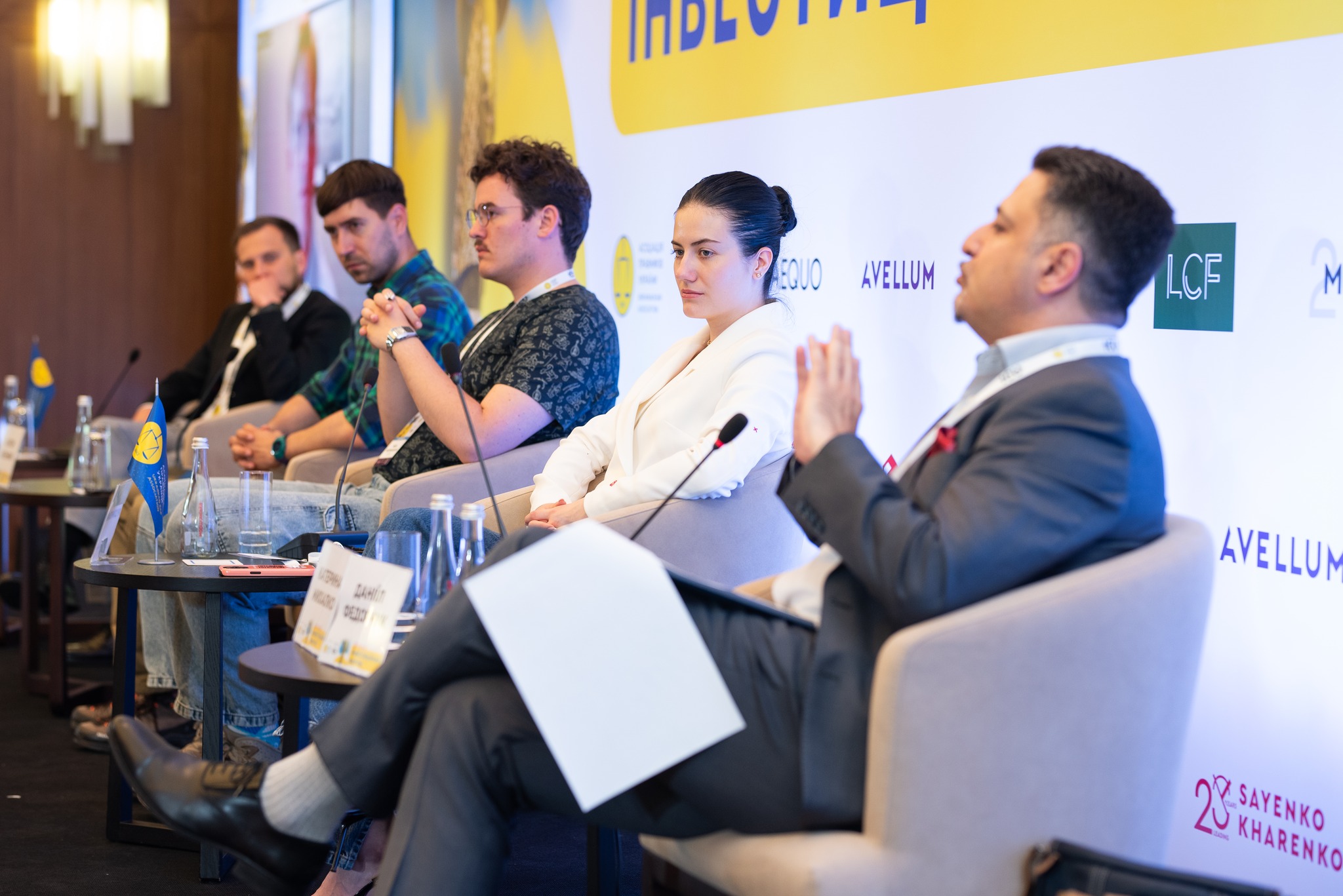
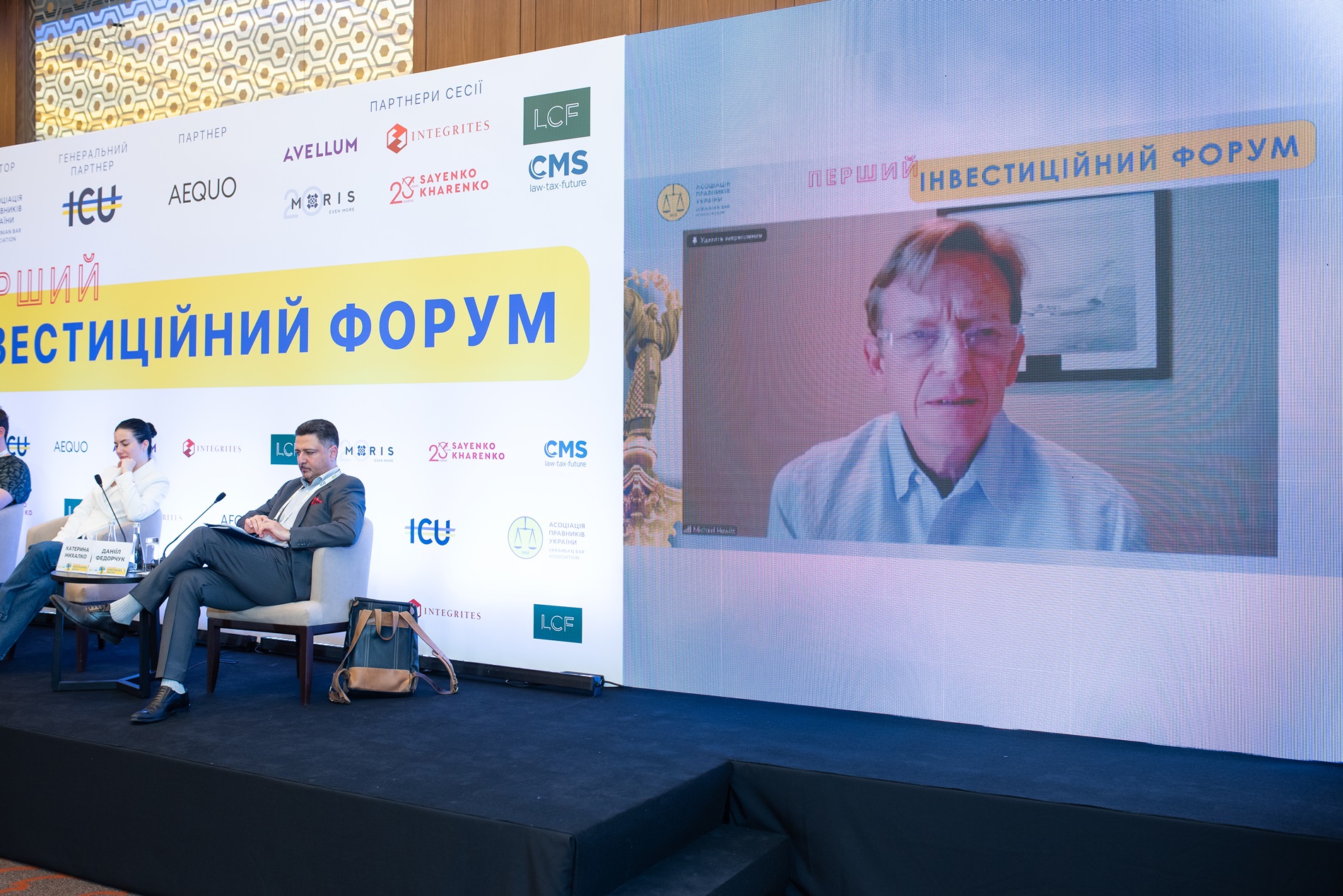
More photos from the First Investment Forum can be found at the link.
The Ukrainian Bar Association thanks General Partner, ICU Group, Partner, AEQUO, and Session Partners, CMS Cameron McKenna Nabarro Olswang, SAYENKO KHARENKO, LCF Law Group, MORIS, AVELLUM, and INTEGRITES, for their support in organizing the event.
